#my devotion to my cause is paralleled only by his own to his world domination efforts
Text
I'm game canon Eggman's strongest soldier I'll always go to bat for my boy and spread the word that he's always been a well written, consistent, and an absolutely fantastic character in the games no matter what 🥰💜🥚
#I would make a great servant and assistant for him I stg#my devotion to my cause is paralleled only by his own to his world domination efforts#eggman#dr eggman#dr robotnik#dr. eggman#my post
10 notes
·
View notes
Text
i’ve been rambling the whole sunday about sunday to a friend of my friend, so i decided to copy and rewrite it into this post. there’s a bit about gopher wood, sunday (of course) and the dominicus.
is there a chance that i’m just excusing an authoritarian antagonist in text below? yes. am i reaching too deep to prove that he’s “not as bad” (lmao)? yes. my thoughts there are not complex, i don’t intend to dive into every reference to goethe’s faust or the bible (i wish i could) ଘ(*. .)
gopher wood (heavily inspired by catholic priests) groomed sunday from the youngest years to play a certain role, i doubt it’s even debatable (the parallels to the environment me and my friends were raised in hit hard btw but it’s irrelevant, just a fun fact lol). it wasn’t a relationship of father and son (though it sounds now accurate given the religious symbolism) — it was purely transactional and for gopher’s benefit to succeed. sunday just has a heart too big for his own good and took all this manipulation to another level, thus he almost ascended to aeonhood out of his own pure nature despite gopher’s intentions being not pure at all.
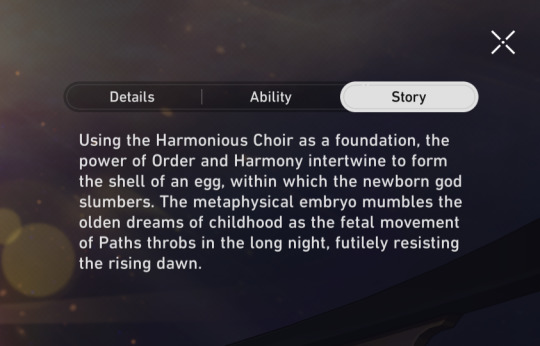
sunday did nothing wrong (like every angel-themed soft-spoken antagonist in any series before, right /j). plot-wise, we had to have a ‘targetable’ antagonist and gopher (merged into the dreamscape) put sunday in his place to be a martyr in his world domination plan. on the contrary, sunday’s intentions were honest, and that’s admirable that he could turn a “somewhat brainwashing controlling type of thing” into something out of good nature — it was still “somewhat brainwashing controlling type of thing” but, if we were to choose between him and gopher (or anyone else tbh because no one has a conviction as strong as sunday), under his rule it would be benevolent. thus, philosophy. he added his own understanding of the role he’s forced to play either way. of course, it still wasn’t good, but at least sunday had good intentions, unlike the family’s initial aim for control (power).
does it technically change anything? honestly, no. we still judge sunday for his actions and he outright said things considered authoritarian and pessimistic. he used to be a hopeful child that wanted to believe in people, but oh well…
gopher couldn’t even sacrifice himself to his own grand plan, so he used sunday — and sunday was more than willing to become the only one person unable to achieve the absolute happiness, even if this whole idea wasn’t coming from his own mind. he’s utterly devoted to the cause because of his little sister (the real family). everything he’s doing was out of literal love (for robin) and extending it to embrace the humanity, too, because he doesn’t hate humans — he pities them. to the point where he almost ascended, despite not wanting to revive a dead aeon or become one himself.
embryo of philosophy — now, that’s the question. would he be reborn as a completely new aeon of philosophy? or was it just a temporary name? something between order and hamony, his own thoughts filling the void in between. where his heart is too kind for order, but too broken for harmony. i wonder if him becoming an aeon would break him out of gopher’s initial motives? at the cost of his own freedom. perhaps either this or robin rescuing him…
because he genuinely believed that the ends justify the means, but he didn’t like what he was doing, constantly struggling between choices. is there no other way? but corruption is so deep-rooted in others that he’s willing to take the burden if it means bringing the ultimate peace…
the thing with characters in fiction like him is that, depending on which ‘side’ will you put them, the same exact goal sound either as the best idea ever or the worst idea ever, without changing a single word.
was he our ally plot-wise, his goals would still be better than the current state of penacony, and we probably would support him. but he was placed on the opposing side as our target, manipulated by gopher and working in his stead. so, heroes focused on the part that he plans to take away their freedom and decided to stop him. valid. also that’s the whole idea of catholic paradise, but i’ll leave the topic before even starting it (but if you get me, then you get me).
#hoyo ノ#btw i can’t believe that spotify shuffled me neon genesis evangelion opening when i was typing all of this#i really hope i’m not upsetting anyone with my religious yapping#i’m too shy to elaborate on some topics anyway so pls don’t mind me#perhaps got too excited that there’s something i can relate to in hsr from life experiences hehe#i really should just focus on finishing all these smuts with him#because i have like 3457 of them just unedited
6 notes
·
View notes
Note
I am begging for your thoughts/elaboration on BKDK and “absolute love corrupts absolutely/becomes ruthless amorality” from the tweet you reblogged <3
i'll try my best!!! idk if it'll make much sense tho
but basically, bakugou and deku respectively are characters who's actions, words, and emotions adominated by a strong and central set of core beliefs that they rarely stray from. the both of them are very different in how these beliefs come to be, but on the surface they function the same. they share a single-minded focus, and are driven so absolutely by these beliefs that it inspires their hero classmates to follow in their shoes. in short, they're characters who while on the surface seem very different, are similar in this one specific way.
what's important to know also is how these systems are developed over time. deku as a character is driven primarily by his martyrdom. it's one of his failings as much as it's one of his strengths, but arguably his inability to fault the hero system means he is loyal to it through every single incident because to shake that would make his entire belief system crumble in and of itself. the deku / allmight and endeavor bakugou parallell is a very obvious one but truly and most of all - both deku and allmight are incapable of understanding how the hero system has damaged the world in maybe equal or less parts than it has saved it. but dekus is ultimately because of a sense of fondness for hero society he is unable to process in himself.
bakugou is a character who builds his belief system on the absolute efficiency. many of his emotional failings and inability to be vulnerable he only accepts because he is able to justify and intellectualize his emotions in how they will aid his journey in becoming number one. his pragmaticism isn't from nowhere. rather he's a character who's so perceptive and rational that aside from his emotions, he can use evidence and observation to cement his own beliefs. he is wildly disinterested in ethics or ethical behavior in a way that comes off comedic and believes his own dogma to be absolute - only accepting the beliefs of others if they prove strong, reliable, trustworthy etc.,
in short, both of these characters are extremely able to justify whatever actions necessary to reach their achieved end. much of their arcs respectively is learning to not do that and see outside of their bubble.
in the case of love, both of them are intensely bad at understanding their own emotions (but bakugou much less so) that i don't doubt that love in all forms is able to corrupt them completely. because the unfamiliarity vulnerability of love, the tender intoxicating warmth of that would probably destroy the defenses they've built for a long time. neither of them cope well with emotions and how those emotions absolutely dominate their will at times.
both of them would immediately jump to justify themselves in that case. it's not that they won't know. it's that that their devotion to the cause is blinding, and if you are to become a part of their personal cause, i find it hard to imagine that the wouldn't justify their every move to save or protect you.
the only difference being that bakugou knows it's selfish and doesn't care - he will rationalize and tell people what they need to hear. he'll lie if he has to.
but deku will convince himself that it's for some greater good and truly believe that because he's incapable of understanding his own desires. both of them are just sort of like that
#return to sender#it's not about willingness to commit atrocities#i just think they are able to justify whatever they do and get away scot free#that makes them ruthless i suppose#neither of them are truly above using their status nor do the embody moral goodness in such a way that matters#idk if this makes sense jkfkjs
33 notes
·
View notes
Text
J-Novel Club Anime Expo Lite 2021 Announcements

J-Novel Club took to Anime Expo Lite 2021 to announce yet another sizable slate of titles, many that will launch later today on the service digitally, from pulp novels to its light novel bread and butter and everything in-between, J-Novel Club’s latest slate has something for everyone. Without further ado, the slate of announcements.
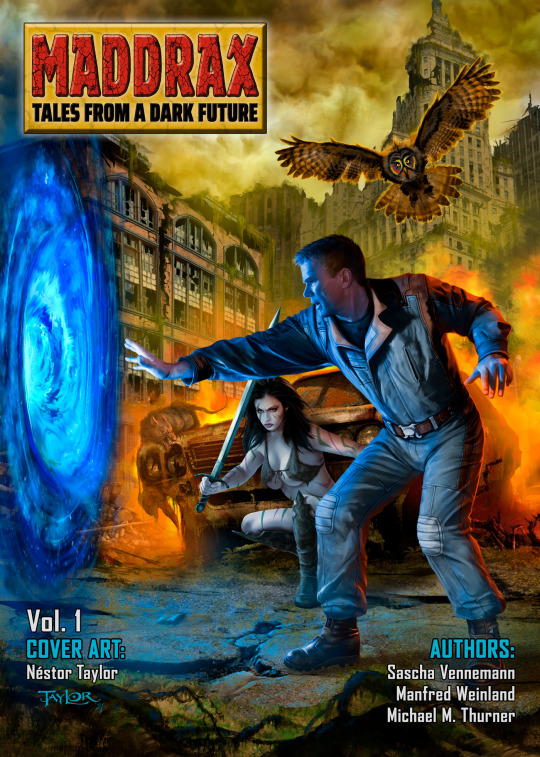
Maddrax by Various Authors with Cover Art by Nestor Taylor
When a comet struck Earth, Matthew Drax found himself sent 500 years into the future - only to find civilization in ruins. In a world filled with barbarians, hostile mutants, and lost technology, Drax and co. cross the globe in search of adventure. Having recently saved the world by restoring the moon from its falling orbit, an accident in proceedings causes pockets of parallel worlds to dot the globe. What new dangers await Matt and his travelling companion, the telepathic warrior queen Aruula, as they cross these strange gaps in time and space?
A J-Novel Pulp title launching today with Part 1 of Volume 1!
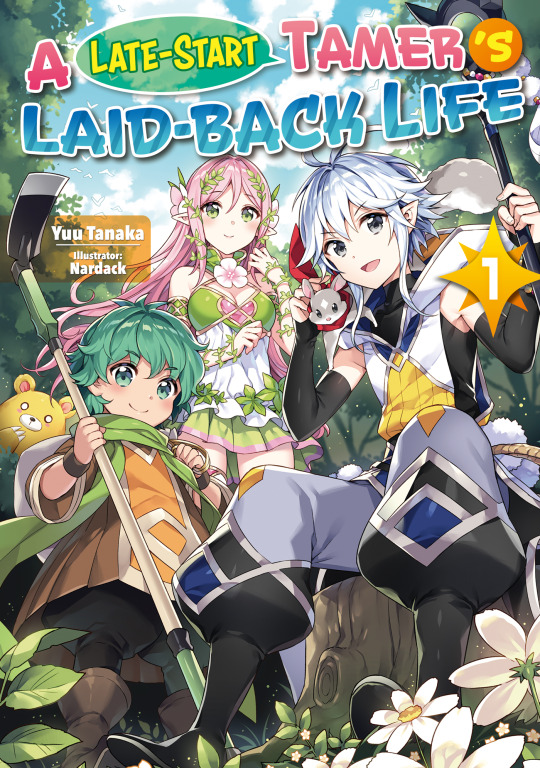
A Late-Start Tamer’s Laid-Back Life by Yuu Tanaka with Illustrations by Nardack
Old MacDonald had a...gnome?! The Law of Justice Online, also known as LJO, is the hottest new VRMMORPG of the season, and office worker Yuta Sasaki is one of the lucky few granted access to the official launch. After some careful research, Yuta is chomping at the bit to start his virtual life as a Tamer, a class that harnesses the powers of wild monsters. Luckily, upon building his character, Yuta manages to land not only his chosen class, but a heap of bonuses to boot! He soon finds, however, that his abilities are not all they're cracked up to be, and that the talents of the rare first monster he is granted lie not in combat...but gardening! Already well behind the other adventurers, and facing a long and slow progression path ahead of him, Yuta is left with two choices—start over from scratch, or make the best of what he has been given. For Yuta the choice is obvious: When life gives you manure...start up a farm!
Launching today with Parts 1 and 2 of Volume 1!
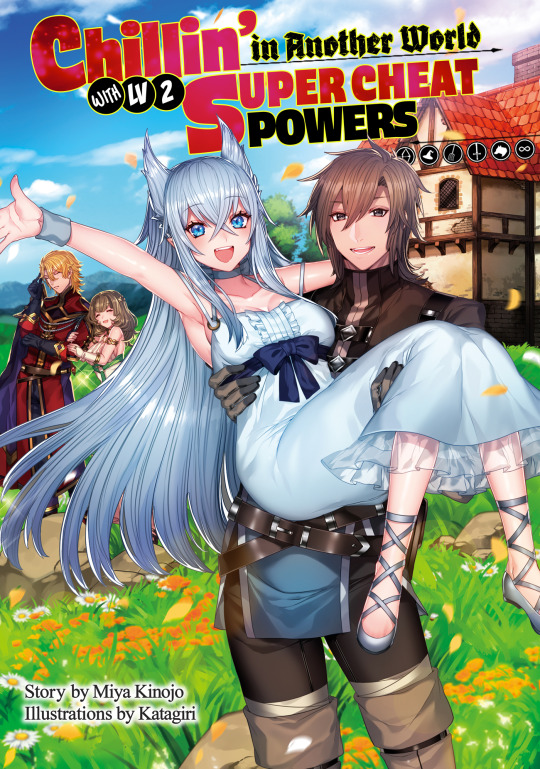
Chillin' in Another World with Level 2 Super Cheat Powers by Miya Kinojo with Illustrations by Katagiri
The Magical Kingdom of Klyrode summons hundreds of heroes from other worlds every year to fight in their war against the Dark One and his army of powerful demons. Banaza is one of those heroes, summoned from the Royal Capital Paluma, but something’s not right—Banaza is only an average merchant. He has no magic, no fighting ability, and his stats are abysmal. Worse, a mishap leaves him unable to return home! Rejected as a hero and stranded in another world, abandoned to the far reaches of the kingdom by a cruel king who just wants him gone, Banaza’s fate looks pretty bleak. But what will happen once the failed hero candidate finds himself with super cheat powers once he hits level two?
Launching today with Parts 1 and 2 of Volume 1!

Min-Maxing My TRPG Build in Another World by Schuld with Illustrations by Lansane Commissioned in death to save a world in peril, a tabletop RPG fanatic is reborn as a humble farm boy with the rulebook for the universe at his fingertips! Young Erich’s quest for an invincible character build will require more than his decades as a number-crunching munchkin, though. Even with powerleveled skills, feudal life is no cakewalk—especially when you keep drawing more attention than you can handle…Can Erich adapt to his strange new world before his worst impulses take the campaign of a lifetime completely off the rails? Let the dice fall where they may! Launching today with Parts 1 and 2 of Volume 1!
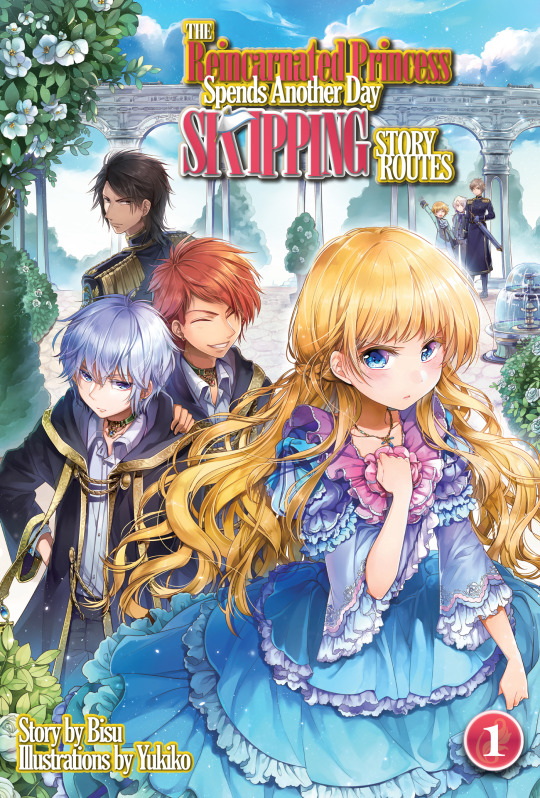
The Reincarnated Princess Spends Another Day Skipping Story Routes by Bisu with Illustrations by Yukiko
After an accident, a modern careerist is reborn as Princess Rosemary Von Velfalt. She soon realizes that her new life is identical to that of a rival character in an otome game that she’d once played to “100%” completion. Luxury and magic abound in the Kingdom of Nevel, alongside a collection of attractive men. However, beneath the suitors' dazzling faces lie awful personalities: masochists, necrophiles, and perverts, oh my! But it’s not all bad news—the side characters are perfect, and Rosemary has fallen for the captain of the royal guard.
Since the game offers no true route to happiness, Rosemary decides to forge her own path; to avoid marriage with the suitors, she'll have to skip their story routes and fix their deviance. She’ll navigate palace and marriage politics, kidnappings, and the threat of war, all while contending with a world that’s drifting further from the game she remembers. “100%” game completion isn’t all it’s cracked up to be— sometimes, “0%” is the route to a dream life! A J-Novel Heart title launching today with Parts 1 and 2 of Volume 1!
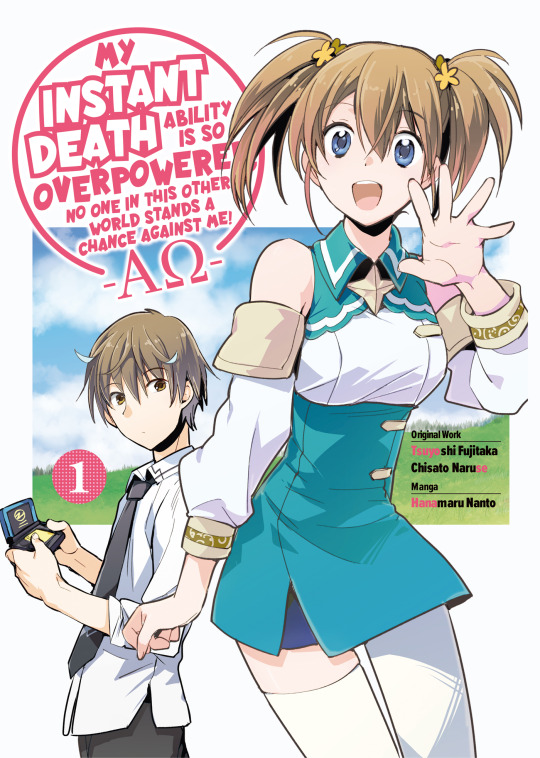
My Instant Death Ability is So Overpowered, No One in This Other World Stands a
Chance Against Me! —AΩ— (Manga) by Hanamaru Nanto, Based on the Novels by
Tsuyoshi Fujitaka with Original Character Designs by Chisato Naruse
Awaking to absolute chaos and carnage while on a school trip, Yogiri Takatou discovers that everyone in his class has been transported to another world! He had somehow managed to sleep through the entire ordeal himself, missing out on the Gift — powers bestowed upon the others by a mysterious Sage who appeared to transport them. Even worse, he and another classmate were ruthlessly abandoned by their friends, left as bait to distract a nearby dragon. Although not terribly bothered by the thought of dying, he reluctantly decides to protect his lone companion. After all, a lowly Level 1000 monster doesn't stand a chance against his secret power to invoke Instant Death with a single thought! If he can stay awake long enough to bother using it, that is...Launching today with Chapter 1 of Volume 1!

Reborn to Master the Blade: From Hero-King to Extraordinary Squire♀ (Manga) by Moto Kuromura, Based on the Novels by Hayaken with Original Character Designs by Nagu
From his deathbed, Hero-King Inglis, the divine knight and master of all he surveys, gazes down on the empire he built with his mighty hand. Having devoted his life to statecraft and his subjects’ well-being, his one unfulfilled wish is to live again, for himself this time: a warrior’s life he’d devoted himself to before his rise to power. His patron goddess, Alistia, hears his plea and smiles upon him, flinging his soul into the far future. Goddesses work in mysterious ways—not only is Inglis now the daughter of a minor noble family, but at her first coming-of-age ceremony at 6, she's found ineligible to begin her knighthood! However, for a lady of Inglis's ambition, this is less a setback and more the challenge she was (re)born to overcome. “It's not the blood that runs through your veins that makes a knight; it’s the blood you shed on the battlefield!” The curtain rises on the legend of an extraordinary lady squire reborn to master the blade! Coming Soon to J-Novel Club!

My Daughter Left the Nest and Returned an S-Rank Adventurer by MOJIKAKIYA
with Illustrations by toi8
The life of an adventurer isn’t always a glamorous one.
Belgrieve finds this out the hard way when a deadly encounter robs him of his leg and the ability to pursue his dreams not long after setting off for fame and fortune. But fate isn’t finished with this retired adventurer! While gathering herbs in the wilderness, he discovers an abandoned baby girl and names her Angeline after deciding to raise her as his own. Angeline grows up to become a top-tier adventurer in her own right, yet after venturing out into the world and making a name for herself, fame, fortune, and power hold no allure for the accomplished S-rank adventurer: her heartfelt wish is for nothing more than to see her father again.
Launching today with Parts 1 and 2 of Volume 1!

Dragon Daddy Diaries: A Girl Grows to Greatness by Ameko Kaeruda with Illustrations by Sencha
“Daddy!” The dragon blinked as the wee little human called out to him. Him? Her “Daddy”? Powerful enough to have been venerated by humankind, yet warmhearted and even a tad ditzy, the dragon soon finds himself raising and doting on the precocious Olivia as if she really were his daughter in this touching tale. The toddler may be impossibly cute now, but just you wait—she’s a curious child and she’s growing up real fast. You can bet that one day, she’ll be the strongest human there is! But first, how will he handle little Olivia receiving an acceptance letter to a human school? Launching today with Parts 1 and 2 of Volume 1!
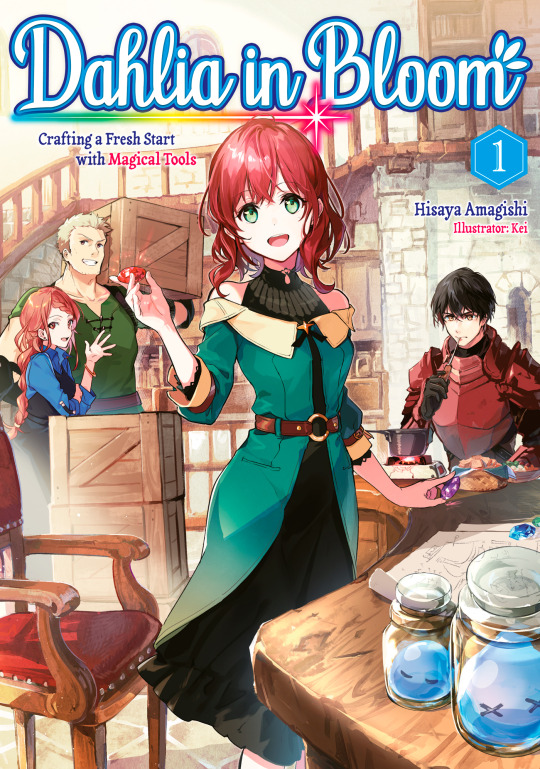
Dahlia in Bloom: Crafting a Fresh Start With Magical Tools by Hisaya Amagishi with Illustrations by Kei
After dying of overwork in Japan, Dahlia is reborn into a world filled with magic. Raised by a master of magical toolmaking, she develops a passion for the craft and becomes engaged to her father’s apprentice. Before her father can see her wed, however, he suddenly passes away. As if this weren’t enough, on the day before their wedding, her fiancé announces that he’s in love—but not with her! Dahlia finally realizes she needs to live for herself. She vows to be her own woman from now on and devote herself to her craft, even if it’s not quite the quiet life she was hoping for! From a chance encounter with a knight to starting her own company, there are challenges aplenty on the horizon. But this young craftswoman is no longer a shrinking violet—she’s Dahlia, and she’s ready to bloom.
A J-Novel Heart title launching today with Parts 1 and 2 of Volume 1!

Hell Mode ~The Hardcore Gamer Dominates in Another World with Garbage Balancing~ by Hamuo with Illustrations by Mo
“‘Level up even while offline’?! That’s not a game on ‘easy mode’—that’s just an AFK game!” The online game Yamada Kenichi had been playing religiously is shutting down its servers, leaving him with a void in his heart. He looks for a new game to fill it, but everything he finds is way too easy. The kind of game he likes—the kind punishing enough to make players want to spend thousands of hours on it—just isn’t around anymore. “What’s this? ‘You are invited to a game that will never end.’” Kenichi stumbles upon an untitled game, one promising incomparable challenge with unprecedented potential. Without hesitation, he selects the “Hell Mode” difficulty. Lo and behold, he finds himself reincarnated in another world as a serf! Now called Allen, he sets out to unlock the secrets of his mystery-laden Summoner class; without the convenience of walkthroughs, game guides, or online forums, he must grope his way to the top of his new world! Launching today with Parts 1 and 2 of Volume 1!
By: Humberto Saabedra
11 notes
·
View notes
Text

GRIEVING, consumed with fear &
mad with loneliness, eden finds
himself more lost than ever ; and
soon, like the distant stars and
constellations he reads about in
books, eden no longer seems to
be part of this world. he imagines
that he is made of the galaxies and
nebulas —— light-years away and
out of mind, out of sight ; drifting
away peacefully in the cold vacuum
of space & building his walls up high
—— cementing them there, strong,
as no one, not even once, comes to
break them down. A LONELY PRINCE
TRAPPED IN THE HIGHEST TOWER ;
that’s what eden becomes yet again.
yet he exudes a quiet unassuming
warmth, for he is closer to the sun
up here.
WHY HELLO THERE LOVELIES !!! i’m edie ( 23, she/hers, gmt+11, cat mum, literature nerd & tea enthusiast ) & my cute lil woc ass is so gosh darn excited to be a part of this muh’heckin amazing group ?!!?!?!??!?!?! i’m here with eden lovegrove ( and cha eunwoo’s heaven-sent face ????? can i get an amen ??!!!?? ) ; a #softnsadboi with a rrrrruff past who i’ll be introducing to you all right down below !!!!
DISCLAIMER : this ???????? is a heckin’ 1000-page novel. 2 ur left u will find refreshments n water —— pls stay hydrated whilst you read thru this !
[ ! ] CLICK HERE FOR A MOBILE VIEW ( less formatted for easier reading ! ) OF EDEN’S INTRO POST !
* ╰ APPLICATION !! ❜ ───
✧・゚( atlas + cha eunwoo + cismale ) 𝒎𝒂𝒎𝒎𝒂 𝒎𝒊𝒂 !! have you seen ( eden lovegrove ) around ? ( he ) has been in kaos for ( one week ). the ( twenty-four year old ) is a ( journalist & freelance writer ) from ( wisconsin, usa ). people say they can be ( ascetic ) but maybe that’s not too bad ‘cause they can also be ( forbearing ). whenever i think of them, i can’t help but think of ( a wound too great ; that always has been & won’t heal, grief ; consumed by sorrow & mad with loneliness that yet still could not keep the boy from kindness, and softness ; emanating from starlight and filling him full to the bone ). ・゚✧ ( penned by edie, 23, gmt+11, she/hers ).
* ╰ STATISTICS !! ❜ ───
basics
BIRTH NAME: eden park
ADOPTED NAME: eden lovegrove
BIRTH DATE: february 25th, 1995
ASTROLOGICAL SIGN: pisces
AGE: twenty-four
CURRENT LOCATION: kaos, greece
NATIONALITY: american
ETHNICITY: south-korean
GENDER: cismale
SEXUAL ORIENTATION: demisexual
ROMANTIC ORIENTATION: homoromantic
background
BIRTH PLACE/HOMETOWN: wisconsin, usa ( birthplace & childhood residence ) —— manhattan, ny, usa ( late adolescence )
SOCIAL CLASS: lower class ( birth ), upperclass ( during late adolescence / adoption ), middle class ( present )
EDUCATION LEVEL: completed a journalism degree with honours at yale
FATHER: franklin park
MOTHER: dolores park
SIBLINGS: matthew park, christopher park
FATHER ( ADOPTIVE ): chet lovegrove
MOTHER ( ADOPTIVE ): amelia lovegrove
SIBLINGS ( ADOPTIVE ): everett lovegrove
OCCUPATION & INCOME PRIMARY SOURCE OF INCOME: journalist ; writing articles for guardian u.s.
SECONDARY SOURCE OF INCOME: freelance writing ; prose, poetry, essays, published in zines & online
CONTENT WITH THEIR JOB? yes
PAST JOBS: bookshop clerk, library assistant, florist
SPENDING HABITS: very thrifty ; good at saving
MOST VALUABLE POSSESSION: a faded photograph of himself and his first love, now passed away
appearance / physical information
FACE CLAIM: cha eunwoo
HAIR COLOUR: black
EYE COLOUR: brown
BUILD: mesomorph
DOMINANT HAND: left hand
HEIGHT: 183cm
WEIGHT: 76kg
INK: none
PIERCINGS: none
ALLERGIES: shellfish
DIET: vegetarian
psychology
MBTI: infp
ENNEAGRAM: type 2 ; the helper
MORAL ALIGNMENT: chaotic good
DOMINANT TEMPERAMENT: melancholic
PRIMARY INTELLIGENCE TYPE: verbal-linguistic & intrapersonal
SOCIABILITY: medium
EMOTIONAL STABILITY: stable
DRUG USE: no
ALCOHOL USE: yes
PRONE TO VIOLENCE? no
VIRTUES: ardent, profound, forbearing, sagacious
VICES: reclusive, distracted, withdrawn, ascetic
HOGWARTS HOUSE: ravenclaw
ACCENT: manhattan accent
FAVOURITES ACTIVITY: reading, baking, knitting, writing, going on walks
ANIMAL: cats
BEVERAGE: boricha / barley tea
COLOUR: powder blue
FOOD: yachae sundubu jjigae / spicy soft tofu and vegetable stew
CELEBRATION: christmas
MODE OF TRANSPORTATION: walking
MUSICIANS: keaton henson, flyte, palace, the black skirts, banff, kelsey lu, matt maltese
SCENERY: the ocean
BOOKS: disoriental by négar djavadi, the uncensored picture of dorian gray by oscar wilde, when i hit you: or, a portrait of the writer as a young wife by meena kandasamy, brother by david chariandy, & 10 minutes 38 seconds in this strange world by elif shafak.
* ╰ THE STORY !! ❜ ───
eden’s biography is trigger heavy, with the following triggers —— religious fundamentalism, homophobia, racism, physical & emotional abuse.
CHAPTER ONE : THE LONELY PRINCE.
COLOURED BY AMBIGUITY and suspended in an air of INEXACTNESS from the moment he breathed his first breath, eden park was born into the world as a simple PLACE HOLDER between his older and younger brother —— caught in the middle, outshone on both sides, and quite often FORGOTTEN, even as a child.
in amongst frank and dolores park’s hopes and dreams for their eldest and youngest sons, eden learned terribly early on that his existence mattered VERY LITTLE to anyone at all —— for while the youngest son ( matthew ) was doted upon, fussed over and coddled, and the eldest son ( christopher ) was given the responsibility of shouldering the entire burden of the park family name [ a family with important ties to the church community in wisconsin ] ; eden seemed to FADE AWAY into the background —— more an OBSERVER of his family’s comings and goings than an ACTIVE PARTICIPANT in amongst it all. growing up, eden had no particular expectations placed upon him, nor was he deemed any specific role to play ; and so he often spent his time ALONE and off and WANDERING, DRIFTING from interest to interest ; from this to that, biding his time in the absence of his parents who had their hands full with matthew and christopher, and their devotion to the religion that had gotten them through the hardships & aftermath of the korean war.
where his home life was tainted with an estranged apprehension, when eden was old enough to start attending school he discovered that this new part of the world was no sanctuary for him either. his peers pulled at the corners of their eyes whenever he passed, called him yellow, and jeered at the unusual & pungent packed lunches he brought. as the real world gave the young boy no reprieve ; eden turned to books —— opening the covers and crawling inside the pages to feel safe and at peace. with each new page, he would escape the exhaustion of his family life, and the terrors of the society around him would all but fade away. by falling into the quiet blank spaces that separated the printed, parallel lines of black, eden found himself a sanctuary of utter calm and peace ; safe at last from a world that was too cruel and too loud for his heart to bear the burden of.
and so the days passed & darkened. ballet, books, and an overwhelming sense of BEING ALONE ; eden spent his days growing his mind & heart in SOLITUDE, quite nearly completely HEEDLESS of extremist religious views his parents and siblings propagated as the world spun madly on. eden’s ballet recitals : missed by his parents, morning mass went by without breathing a single word to anyone —— the middle bed, left untucked. SURROUNDED by so many people and still so estranged, eden never truly was a part of the family he’d soon fatefully grow to HATE.
the only sanctuary of hope and light for eden was the one he found in a friend, then confidante, then lover ; a boy he’d met in ballet class at 8.
the boy who changed everything for eden.
the boy he was caught kissing at 16 in the park family’s garden ; blood red roses blooming.
SCREAMING, A BODY BROKEN, AGONY SINKING INTO EDEN’S BONES.
FADE TO BLACK.
CHAPTER TWO : THE HEART CAN BEAT OR IT CAN BURN.
sixteen years old, and eden awakes to the sight of his lover standing over him with a smile. brown eyes fill with tears of relief & a chest so sore it could burst begins to shake with sobs. the tears clear eden’s vision ; and as he becomes more lucid, the vision of his lover fades away. ALONE IN A HOSPITAL ROOM, the boy scrambles to recollect the series of events that led to his arrival in the emergency room ; something buried deep in the labyrinth of his mind unsettling, warning him, letting him know that he’s not ready to remember. the nurses don’t look him in the eye, and the doctors reek of a sickening mixture of sympathy and pity. everything is raw, and horrid, and lonely, and eden can’t quite figure out the reason behind why his heart feels so terribly broken.
after three sleepless days and nights, a social worker visits eden —— relaying to him the chain of events that led to his broken body & weakened soul. the social worker tells eden of how he and his lover had been caught kissing among the flowers —— she tells eden of how his brother, matthew, had discovered them. then she tells eden of how his family had hatefully beat the only person he had ever loved into a coma ; and how when their rage had still not been satisfied, in a fury, they turned on their own son and brother.
THE WOUND IS TOO GREAT —— it always has been & it won’t heal, and eden’s cries rip through the hospital ward like a scream of agony. his tears make him tremble so violently he feels as if he were a rainstorm shook by lightning.
.
.
.
the recovery is a long & arduous one. knees grazed scarlet —— every night, eden PRAYS. he prays for his lover, he prays for his family, and he prays for god to change him ; to save him ; to cleanse him of his sin ; black, purple & blue covering every inch of his soft skin. most of all, though, eden prays that the loneliness and pain that grows inside his heart like a disease will cease spreading ; the boy’s pillow stained with tears as he cries himself to sleep each night.
mutilated, torn, tortured & etched away at, eden is alive, but he is nothing but a hollow body ; a home for little more than an agonised, sorrow-drenched soul.
just one week after the incident, eden’s partner passes away ; and eden is taken into the care of the state —— never to hear from his parents or brothers again ; safe at last from them.
CHAPTER THREE : I WILL NOT RAISE HELL; HAVE WE NOT ALL ALREADY SUFFERED ENOUGH? I WILL RAISE MY VOICE, AND I WILL RAISE CONSCIOUSNESS.
ten months after the incident, eden is adopted into a family by the name of lovegrove —— a family tainted with far too much darkness for eden to ever call home. the lovegroves are an all-american, white family with ties to the republican party ; with the head of the family, chet lovegrove, having strong political aspirations. the lovegroves adopt eden into the family as a move for positive press, believing that having a person of colour adopted into the family will make for a more empathetic family narrative.
and so it goes that eden park is given the new name of eden lovegrove, and once again, THE WORLD SPINS MADLY ON. while under the gaze of the public-eye chet and amelia lovegrove parade their new son eden around as if he were the sole pride of the family ( much to the chagrin of everett, the lovegrove’s biological son ), behind closed doors, they stand back and do nothing as everett calls eden words like chink, faggot, gook, fruitcake and coolie ; disdain and disgust dropping from every syllable like venom.
grieving, consumed with fear & mad with loneliness, eden finds himself more lost than ever ; and soon, like the distant stars and constellations he reads about in books, eden no longer seems to be part of this world. he imagines that he is made of the galaxies and nebulas —— light-years away and out of mind, out of sight ; drifting away peacefully in the cold vacuum of space & building his walls up high —— cementing them there, strong, as no one, not even once, comes to break them down. A LONELY PRINCE TRAPPED IN THE HIGHEST TOWER ; that’s what eden becomes yet again. yet he exudes a quiet unassuming warmth, for he is closer to the sun up here.
.
.
.
as eden grows from adolescence to adulthood —— though he leaves ballet in the past, where memories too painful to bear the burden of have no risk of being dredged up —— his love for books and writing never waivers even in the slightest. literature helps him understand himself as he comes to terms with the world around him, and writing helps him find a voice in a world where people keep trying to tell him what he ought to be. traumatised, a foreigner, a faggot, a stranger amongst his own family. an outcast, an orphan, a charity case. with his pen as a sword ; ink running like blood, eden finds his voice —— learning to use it to speak words of love and truth in a world that has only ever been cruel to him ; raising his voice so that it can be a light in the darkness.
high society life tastes bitter upon eden’s kind palette ; and though he is treated with nothing but malice within lovegrove manor or the high society around him, eden endures the trials and tribulations of his new life in order to use his predicament for his own benefit. rather than fixating on the cruelties of his adoptive family, eden decides to focus instead on the opportunities that have presented themselves ; using the money and the connections that the lovegroves possess in order to grow into someone that his lover, lost in wisconsin but forever in his heart, can be proud of.
a quiet renegade, eden decides to pursue journalism, graduating with honours from yale ; becoming a questioner of the common, and using his compassion and kindness and his love for words to grow into a safe-harbour for the voiceless. his first piece, an exposé on the callous and tokenistic life he has lived with the lovegroves, leaves him branded as a traitor by the family that took him in for their own devices ; and finally, after being cast out in shame, eden finds himself free at last.
the name lovegrove suits him well, however ; love becoming him, love consuming him —— and so he keeps his adoptive surname, wearing it like a battle wound for all the world to see. writing of people’s stories, in search of the truth, kind, but lonely, this is the way that eden lovegrove spends his days.
.
.
.
ink-stained fingers & a sorrow-drenched soul that only wants to heal ; the stars, the moon, a study of the human condition through prose and endless essays. a journalist at guardian u.s., and a freelance writer, eden lovegrove is an ink splatter of words thrown against kaleidoscopic feelings —— messy, hurt, lost, ardent, sincere, broken, human, and so much stronger than he knows.
WHERE ONE STORY ENDS, ANOTHER BEGINS : ATLAS IN OLYMPUS.
“ SOMETIMES I GET THESE VISIONS —
HORRIBLE VISIONS OF INEXPLICABLE
VIOLENCE, GRIEF & SORROW [ … ]
LIKE REMNANTS OF A PAST LIFE
BLEEDING INTO MY PRESENT. ”
over the course of the past six months, eden has started experiencing some truly horrendous nightmares —— these terrors sometimes even creeping past the border of sleep, haunting him in visions during hours of waking.
trauma from the park household, trauma from the lovegrove family ; that’s what eden believes, and that’s what his therapist believes. how could they know that these visions are actually coming from a past life ? one where eden was condemned to hold up the celestial heavens for eternity, as atlas.
“ TAKE A BREAK, SON. A VACATION.
THE WORLD WILL STILL BE HERE TO
WRITE ABOUT WHEN YOU GET BACK.
YOU GOT A GIRL ? TAKE HER SOME
PLACE NICE. ”
eden doesn’t know how to tell his editor that he’s never had a girl, and nor will he ever. but the vacation doesn’t sound like too terrible an idea —— so eden packs up his belongings, and asks a man at the airport counter what the cheapest & earliest flight to someplace nice would be. KAOS, the man says. the island of kaos. and just like that, atlas finds his way to olympus.
.
.
.
eden’s toes curl gently into a horizon of golden sands ; soft waves lapping at his feet as he relearns how to breathe. a softness emanates from the setting sun ; filling the broken man, full, to the bone. the world is wide —— and for the first time in his life, on this strange and beautiful island called kaos, eden feels like he might be in exactly the right place at exactly the right time.
since arriving in kaos one week ago eden’s nightmares have been getting worse ; and the visions, strange, violent, and full of glimpses of sorrow, split his head with migraines —— yet curiously, eden does not feel as if he is breaking —— on the contrary, it feels as if he is on the very edge of awakening.
.
.
.
–— AAAAAND, SCENE !!!!
i’ll get to posting some replies to starters & interacting tomorrow ( because i’m eXHAUSTED after an excruciatingly horrendous day at work today ), but please like this post if you’d like to plot something up ??? OR LITERALLY JUST slide into my dms and throw headcanons for our muses at me pls ?! bc i’m awfully awkward and idk ?? how ?? to aPPROACH PEOPLE for plotting !!!!!
okie bye i’m going to go make some dinner and then shall slumber for 2000 years, but ilu all already and am so excited !!!! to start !!!! writing !!!!!
#kaos:intro#IDEALLY this would include a tl;dr because it is#....... a straight up novel !#but dinner and then a vERY early night of sleep beckons me so perhaps i will post one tomorrow !#ilu all !#* ╰ we rip out so much of ourselves to be cured of things faster than we should ❜ ─── ( muse )
10 notes
·
View notes
Text
SNK 113 Review
Sad! Edition
Arlingtonpark presents: SNK 113, a play in three acts.
Act I
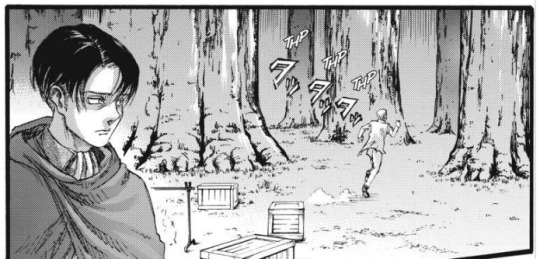
Act II
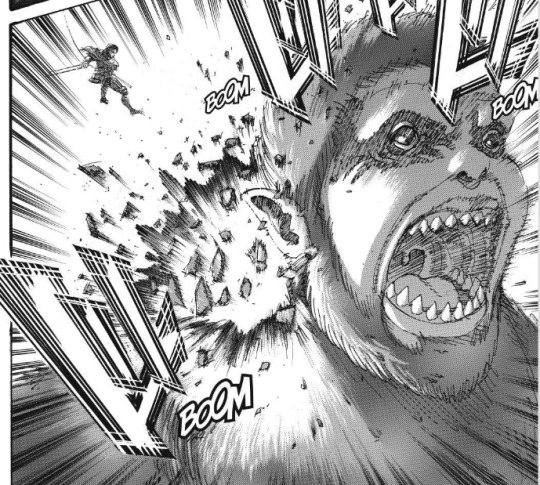
Act III
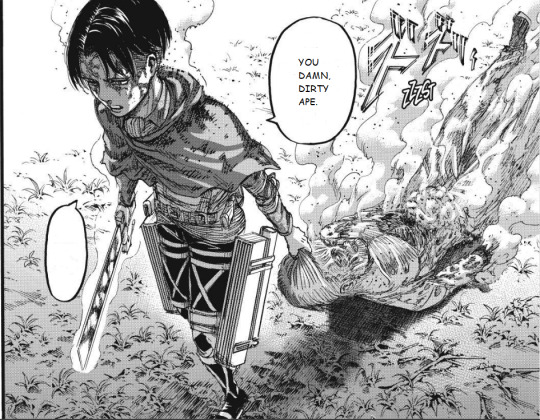
GIVE ME A BREAK, OKAY? THIS CHAPTER DIDN’T GIVE ME MUCH TO WORK WITH!
This was a more leisurly outing for this arc compared to the previous string of chapters. We get some insight into Zeke’s plan (but not a full elaboration), Levi makes a monkey out of him, and the EFC arrives in Shighanshina. That’s it.
Ironically, this was one of the more action packed chapters, yet it’s not as thrilling as, say, SNK 112, which was mostly our main trio sitting at a table.
Our heroes, sans Eren, have been mostly helpless in the face of Zeke and the EFC’s machinations, and Isayama has pressed this to good, suspense-inducing, effect.
We still don’t know much about Zeke, and why Eren is acting like he is now is still not completely understood. The opposition is opaque and they’ve been on a real winning streak so far. Just like how reports of a serial killer in your neighborhood can put you on edge, our heroes are put on edge by…just everything that’s happened so far, and we feel that gnawing fear by extension.
But now might be a turning point.
For the first time, Zeke/Eren (Zeren?)’s plan has hit a real snag. Now, now things will really start to get interesting. Pieck and Galliard did escape and participate in the Liberio fight, and Gabi and Falco are unexpectedly here on Paradis, but those were hardly setbacks. Detours maybe, but they didn’t threaten arrival at the final destination.
This is different. The plan was to rendezvous at Shighanshina and that’s just not going to happen now. Levi is dragging Zeke around like a monkey on a leash and Eren is none the wiser. And there’s no way for him to know that.
It’s not like they can communicate telepathically. unlike Hange and Levi When the time comes to meet up, Zeke isn’t going to be there. From Eren’s perspective, Zeke may as well have disappeared off the face of the Earth.
The plan apparently was to provoke an attack on Paradis by a coalition of the world’s forces. But this plan also apparently hinges on being able to use the Wall Titans to repel this attack. But that’s out the window too now. Zeren’s plan is in danger of catastrophic failure and at the worst possible time.
The enemy is already here. Pieck is on Paradis, no doubt gathering intelligence. It’s good that Zeke is subdued, but that creates a power vacuum and there’s no one around to fill it.
The legitimate government is facing a legitimacy crisis.
The EFC will be in damage control mode now that their plan is in danger of falling through.
And oh yeah, Marley has already infiltrated the island.
Paradis can easily devolve into chaos, now. Pixis’ government is a leader without much of a following; Eren has popular support. The EFC has a following but their leaders will soon be scrambling to regain control of the situation. And all Marley cares about is killing everyone.
And this raises a very intriguing question: How will Eren react to this?
Like I said, things have mostly gone smoothly for him. Yes, Eren’s had this stone cold demeanor, even in the middle of his fight in Liberio, but really he’s been coasting so far. Things have done nothing but go his way. Now it suddenly isn’t. So how does he react to that?
If SNK 112 is any indication, he won’t handle things well. Eren lost his cool at a backhanded swipe by Armin. And I’m not gonna lie, if that was all I had ever seen of Eren, I would have said he was weak.
Sad, even.
When it comes to Eren, Isayama will probably go the classic shonen villain route. Think Frieza or Cell from DBZ. Calm and cool, but only when they���re in control. Once they lose control, they lose their cool and reveal themselves as the wild animals they always were.
This will probably play into his freedom complex. Eren wanted to free humanity from the titans so they could explore the outside world. He framed it in terms of control. Freedom=control is the equation here.
Not being in control, to him, means not being free, so when he realizes he’s not in control anymore, he’s going to go apeshit.
Like the Trumpian figure that he is, Eren will probably resort to dominance rituals to sooth his own ego.
Floch had better watch out. When the guy at the top is a dominance obsessed lunatic, it doesn’t matter how high up the food chain you are. If you’re not at the top, you’re at the bottom. If my Eren=Trump framework is correct, Eren is going to abuse that to hell and back. He’s going to subject Floch and co. to all manner of degradations.
I honestly wouldn’t mind that, if it’s not extreme. Floch would deserve it.
Where do I even start with Floch?
In the past, I’ve compared the story of SNK to the current political landscape in the US. I don’t think this is intentional, to be clear; it’s just a very amusing parallel.
As leader of the Yeagerists, Floch roughly corresponds to Mark Meadows, the leader of the House Freedom Caucus. The HFC is a band of extremist, Trump-aligned, Republican politicians who openly rebel against their leadership. Meadows is the group’s current chairman.
Floch and Meadows share one overridingly important similarity: neither of them can create; they can only destroy.
John Boehner (pronounced “baner.” Seriously.) was leader of the House Republicans, until he was shit-canned because the Freedom Caucus didn’t like him. Here’s how he described their mindset:
“They can’t tell you what they’re for. They can tell you everything they’re against. They’re anarchists. They want total chaos. Tear it all down and start over. That’s where their mindset is.”
That’s basically Floch. He wants to Make Eldia Great Again and he thinks the Wall Titans have a role to play in that, but does he have a plan beyond that? Almost certainly not! That would require building something up, and that is beyond his feeble abilities. He thinks Hange is soft and opposes that. He thinks the military is old fashioned and opposes that.
Is there anything concrete that he supports? He supports using the Wall Titans and he supports Eren’s leadership, but his “game plan” is basically:
Use Wall Titans.
???
ELDIA IS GREAT AGAIN!!1
That’s hardly a plan.
All Floch and his team have accomplished is create chaos and dysfunction.
That’s it.
They instigated a social uprising, decapitated the government, and now? They’re just running around trying to find Zeke. (Even though Zeke and Eren already have a rendezvous point worked out.)
All Floch is good for is blowing stuff up and shitting over everything. But in the words of the great Sam Rayburn:
“Any jackass can kick down a barn, but it takes a carpenter to build one.”
Floch is no carpenter. Floch is a coward. This pitifully small boy. This absolute failson. It’s no surprise at all he’s where he’s at.
Floch talks big now, but that’s only because he’s riding high now. I bet he’s the type of person who buckles under even minimal pressure. You all saw how he was during the Shighanshina battle. Everyone kept their composure even as Zeke’s rocks were closing in on them. Except him. He was the first to crack.
My sense is that Floch is not a constitutionally strong person, and he knows it. And he thinks he’s a coward, so we know he doesn’t think well of himself.
That’s the key. That’s why he is so devoted to Eldia.
He can’t feel pride in himself qua himself, so he has to feel pride in himself qua an Eldian. His logic is that if Eldians are strong then he is strong by proxy because he is one of them.
It’s the same thing with Trump supporters. Trump’s base supports him because Trump wants to maintain the racial hierarchy that benefits white people. And Trump’s base supports that because a lot of them are poor, white people. Because even though they don’t have a lot going for them, “at least I’m not black.” There’s little in their lives to be proud of, so they take pride in their race to feel better about themselves.
It’s like the evil version of gay pride.
Gay people take pride in their homosexuality because it’s a form of psychic preservation. They are denigrated for this one aspect of themselves, so they emphasize pride in that aspect to counter the stigma. It’s a way of preserving their sense of self-worth.
People like Floch take pride in their race because they have no self-worth to preserve. They’re empty and sad. Their race is one of the only things they have going for them. So they fight for Eldian greatness because a restored Empire will make them feel all big and strong.
It is utterly pathetic.
That’s one thing Floch and Eren have in common. They’re both sad. From Eren’s sad enslavement to the vague notion of freedom, to Floch’s sad belief that if Eldia is made “great” he’ll be made great in turn. It’s sadness all the way down.
The exemplar of that in this chapter is when Floch confronts Shadis.
It’s hilarious how Shadis calls Floch out on being a sad pissant and Floch tries to prove him wrong, only to prove him right in the process.
Not only does Floch miss, he’s stupid enough to say so out loud. He even explains what he was trying for.
Duuuude!
Just play it off as a warning shot! You’re trying to put up a tough guy front. Don’t admit to having failed spectacularly.
He would have been better off doing that anyway. Hitting Shadis in the foot just for mouthing off also would have proven him right. If you feel the need to shoot someone for mouthing off to you, then yeah, you are, in fact, a sad pissant.
But if it was just a warning shot to the ground around him, then that still would have been excessive, but it wouldn’t make you look insecure as hell.
To quote Game of Thrones:
“We’ve had vicious kings, and we’ve had idiot kings, but I don’t think we’ve ever been cursed with a vicious, idiot king!”
He’s not just vicious. He’s not just an idiot. He’s not even just a vicious idiot. He’s a vicious idiot with power. God help them.
But this idea of insecurity being the root cause of nationalist behavior raises an important question: why are the denizens of Paradis also on board with this nationalist program?
Well, nationalism runs on tribalism, so the people need to care about their Eldianism. Their being Eldians.
And going by that…it might actually be the Survey Corps’ fault.
At the start of the series, the Walldians were apathetic about the outside world. But thanks to the (not unjustified) efforts of the Survey Corps, the Walldians started to care.
Rod’s titan was over twice as big as the Colossal Titan; it loomed over Orvud like a kid looms over a toy cityscape playset. A lot of parallels were made in that sequence to the original Colossal Titan attack. In hindsight, Isayama, in his typically blunt style, was probably motivated by more than a need for a stylistic flourish. He probably did it to impress on the reader what he intended the Walldians to take away from the same event: From their perspective, this was another Shighanshina.
But the ending was different this time.
This was bigger than the first attack. Much bigger. Thousands upon thousands of people died in the first attack and its aftermath. Literally no one died the second time. Rod’s titan was subdued without incident. Awesome, but it also had the effect of inspiring nationalistic pride in the people.
Historia’s plan, very explicitly, was to exploit these nationalist feelings to the Survey Corps’ advantage. Stopping a second Shighanshina created a sense of communal unity among the Walldians. The plan was to encourage and then use those feelings to “stabilize the situation” as Historia herself put it.
And it worked, only it worked too well. Now those nationalist feelings have carried over to the Marley conflict to deleterious effect.
And then there’s the Wall Maria operation. That was described by the narrator like this:
“The area within Wall Maria represented one third of the land humanity had left. When the territory was lost five years ago, the loss of human life and property was massive. And, as those who remained inside the two walls quickly realized, those losses were only the beginning. It seemed wrong for us to continue living. Whether humanity could survive another day was out of human hands. Everything was now up to the titans. Because humanity had no way of defeating them. But, that day, one boy gripped the dagger in his heart and used it to kill a titan, stomping its massive head into the ground. How did the humans who saw that sight feel? Some were filled with pride. Some were filled with hope. Some were filled with rage. But all of them screamed. Now, if Wall Maria is taken back, what scream will fill humanity’s hearts?”
The term for the “scream” the narrator is describing here is “nationalistic fervor.” The Wall Maria operation inspired further feelings of nationalism in the people. And again, those feelings have carried over.
This is a case study in unintended consequences. They wanted humanity to fight, now humanity is fighting and it’s backfiring spectacularly. The people are out for blood. Only this time the blood doesn’t evaporate without a trace.
It’s very revealing how Floch acts towards Shadis compared to Hange.
Hange didn’t have a very high opinion of Shadis the last time we saw them in a room together, but they still stood up for him. Even when they’re pissed at someone, they still don’t lose sight of the humanity of that someone.
Floch also has a low opinion of Shadis. He ordered him beaten for no reason. Because Floch is a sad, maladjusted, man-child. He sees the world in black and white terms. If you support him, you’re golden. If you don’t, you’re not even human.
It wouldn’t surprise me if Floch actually gets off on abusing whatever power he has over people. Being powerful is a high he doesn’t get to experience often, so don’t be surprised of he savors the exercising of it.
So I’ve noticed that the Survey Corps is still training recruits to fight titans. Who don’t exist anymore.
Ooookay.
Where is Isayama going with this?
Floch cites the stagnation in Survey Corps tactics as a reason why Eldia isn’t great. Isayama isn’t trying to both-sides this debate is he?
Floch is an asshole and his movement is repugnant. He’s a right-wing fucking nationalist. But it seems Isayama is trying to send the message that he’s not wrong.
What is it with this series and this schizophrenic approach to right-wing nationalism? The story has condemned it in certain moments, but when it comes to condemning the actual leaders of this movement, Isayama equivocates.
Floch is an asshole, BUT he’s actually right because the Survey Corps really is backwards thinking and in need of new leadership.
Eren is an asshole, BUT he’s actually right because the rumbling *is* necessary to protect Paradis and everyone else was just slow to accept this.
This isn’t just a case of the villains having a point. The key in situations like that is to show they have a point, but that their methods are obscene. Important to that is showing an actual alternative to those methods. Putting forth an alternative is important because it doesn’t matter how horrific Eren or Floch’s actions are, if it’s the only way to proceed then the argument can be made they are doing the right thing.
When the villain has a point, they have correctly identified a problem, but have incorrectly identified the solution.
With Eren and co. the story doesn’t just depict them as having correctly identified the problem. Their proposed solution is depicted as being at least somewhat correct too.
That’s a problem because it means Isayama is granting undue legitimacy to a repugnant, real world ideology.
Them being assholes should be a feature, not a bug. The bug being that they have a point. But the way Isayama has set things up, it’s that them having a point is the feature and their jackassery is the bug.
It all amounts to the story criticizing the nonessential aspects of this movement while leaving the substantive aspects intact.
At this point we’ll all need gas masks real soon because the smoke just keeps piling up.
The last thing of note is Zeke. Apparently he doesn’t get off on pain and suffering. Who knew.
We are apparently going to finally get a peak (you know it’s only going to be a peak) at his backstory and mindset next chapter.
Zeke worrying about his glasses, which belonged to what seems to have been a childhood friend of his, is obviously supposed to signal that Zeke can in fact empathize with people.
I am…warily looking forward to this. The ending blurb teases that he does in fact have a reason for what he’s doing. What I hope Isayama will do, because I think it would be a cool twist, is reveal that Zeke’s motives and plan is merely internally logical, but from an outside perspective, his plan is still totally batshit insane and maybe even nonsensical.
Because that’s how it is with people. People are rational actors, but all that means is that they respond to incentives and harms as they themselves weigh them in accordance with their own internal value system.
In other words, people act in a way that is always internally logical but not always truly logical. The prisoner’s dilemma is a classic example of this. Everyone acts rationally and because of that everyone loses.
How interesting would it be if Zeke’s motives only make sense to him, but are still, in a way, understandable?
The next chapter will end the second volume of this arc. Based on past chapters in a similar position, it will probably end on some event that rapidly escalates the conflict. My guess is that it’ll end on Marley launching its attack on Paradis.
SNK 114 awaits.
18 notes
·
View notes
Text
Deconstructing Scores
Flux Scores
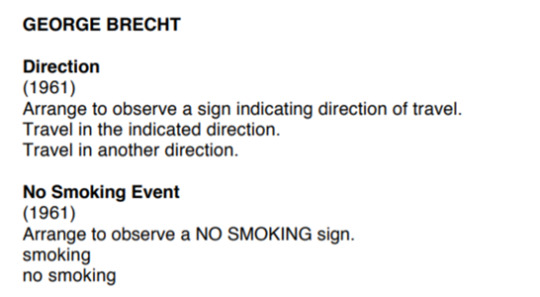


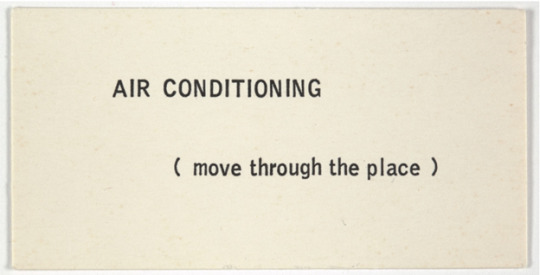
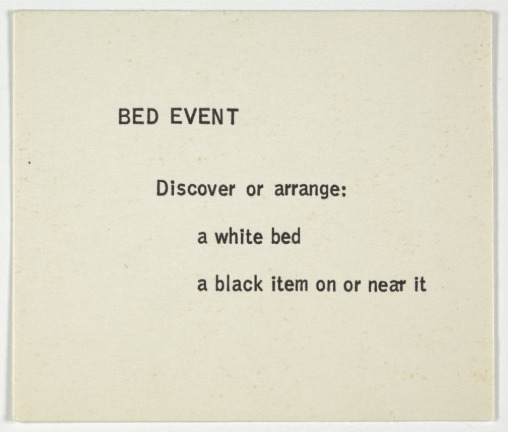
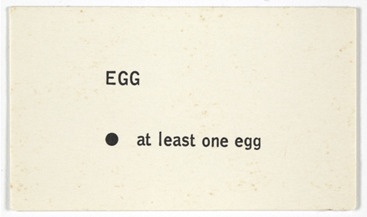
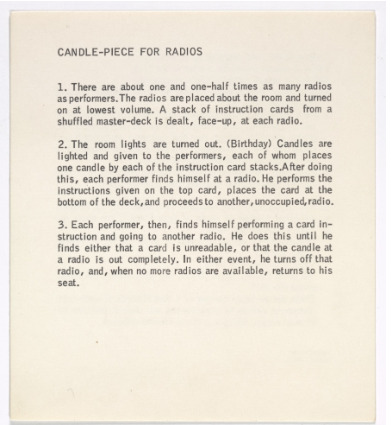
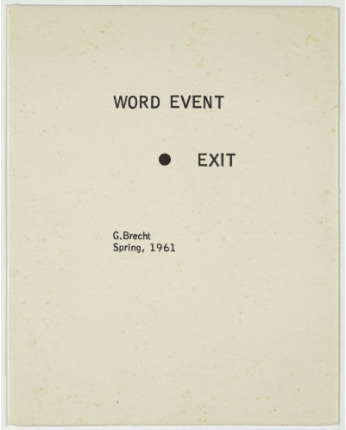
Semiotics
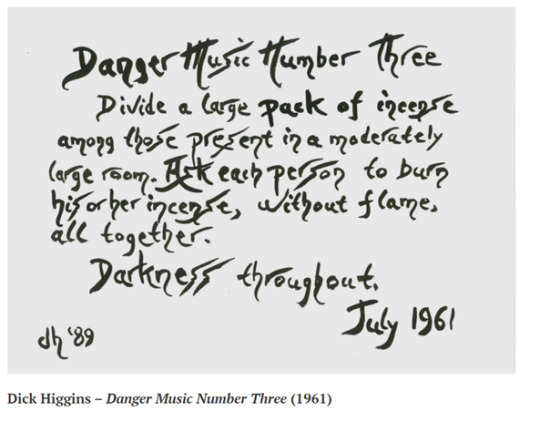
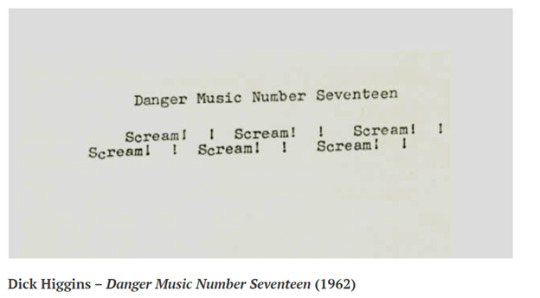
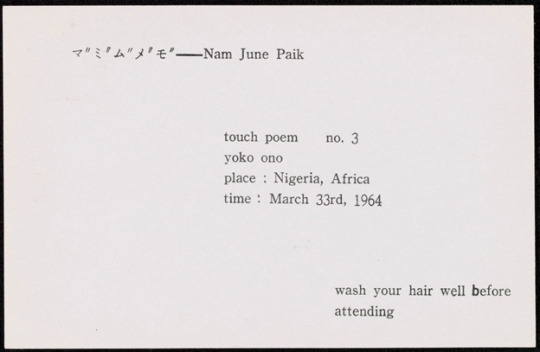


Understanding Flux scores:
“They are people who are really trying to turn you on to the superlative activities you do everyday.” – Allison Knowles https://vimeo.com/36770983
“What I want people to see is how really simply things can be done if you concentrate on that’s what what you’re doing.” – Allison Knowles
Event scores were the dominant Fluxus work, which particularly was distributed in Fluxus Boxes. One of the first of these boxes was George Brect’s Water Yam.
Dick Higgins called Fluxus scores “intermedia”, “a dialectic between media”. Intermedia is not media supported by other media, but rather media that is at the same time another media.
Dick Higgins also published scores called “Danger Music”. These scores imply both visual and audible elements. Some of them are dangerous and pretty much impossible, while some others are mundane.
“How an event score should be performed depends on its notation it uses and the degree of freedom that the score offers. While some scores are so free that one could think that a performer could do anything, this freedom often compels the performer to restrict and edit their work.” – Virginia Anderson
What details can be understood by analyzing all aspects of the score? Does the title give more context to the score than the text?
Some of these pieces attempt to transcend the objects into music and theater. As Allison Knowles does with her performances of her salad piece.
From Virginia Anderson’s analysis of scores, it seems that event scores aren’t meant for the performer to experience, but simply as an alternative to performance. I’ll look for alternative takes.
As I go deeper into learning about fluxus scores, it seems that while these may parallel games in a sense that there are instructions to follow, they are not actually games. These are in fact performances that have play-like elements. How am I making this distinction? With event scores it appears that none of them were meant to be performed by a person for the sake of performing them, but they were meant to be performed for others as music or theatre would. For this reason it isn’t exactly helpful to state that these are forms of games, but it may be valuable to view them through the lens of games instead.
This also may change with later scores.
George Brecht – “a deeply personal, infinitely complex and essentially mysterious, exploration of experience. No words can ever touch.” (Project in Multiple Dimensions)
An aesthetic form that Brecht theorized was that of the “Chance-Image”. Chance being based off the latin words taken from dice falling.
“The word ‘chance’ (with a Latin root relating to the falling of dice) can conveniently be taken to mean the cause, or systems of causes, responsible for a given effect is unknown or unlooked-for or, at least, that we are unable to completely specify it. Of course, in the real world, causes are also effects, and effects causes.” – Brecht Chance Imagery
An appeal of chance-imagery is to place the artist’s images to be equal with that of nature’s images as the mind is capable of infinite image formation. Thus making the artist’s work nothing special.
“Words only permit us to handle a unified reality by maneuvering arbitrarily excised chunks.” – Brecht Chance Imagery
“In the event, everyday actions are framed as minimalistic performances, or, occasionally, as imaginary and impossible experiments with everyday situations.” - Hannah Higgins Fluxus Experience
Kotz and Ouzounian point out that part of the problem with Fluxus scores all being put into a single category is that their process becomes homogenized and Brecht’s work becomes known as performance.
In George Brecht’s notebooks he saw the idea of scores in other musical pieces and took note of them as study material: Anton Webern’s Symphony Op. 21 (1928), Karlheinz Stockhausen’s Klavierstücke XI (1956), an unnamed composition by Christian Wolff for prepared piano (probably Duo II for Pianists), and Music of Changes (1951). Brecht saw the number of pitches as “events” in these pieces. In some ways this could be similar to looking at event scores as games.
“My life is devoted to research into ‘the structure of experience’” – Notebook entry January 1959
George Brecht saw a really really scientific view of the world. Looking at everything from the causal and physics level.
George Brecht’s first exhibition “Towards Events” is weirdly reminiscent of my own semi-exhibition I had inside of the Statens Museum for Kunst. Objects were accompanied by instructions to be performed. There is probably some interesting things to be found by comparing my Irrational Games exhibit to this one.
“Brecht’s model of the Event was arguably an attempt to realize such an enlightenment by pointing to the chanced form as an arbitrary subdivision of the ‘unified whole’ of the universe. An arrangement of an object or objects is a ‘performance’ of this whole in that it frames moments or subdivisions within it, i.e. ‘[gives] order (physically or conceptually) to a part of the continuum with which [a person] interacts’.” – Ouzounian
“Some Event scores illustrate this concept quite explicitly. Three Aqueous Events, for example, lists three momentary states that an aqueous ‘object’ may occupy over time: ice, water, steam.6 A realization of this score entails performing (arranging, observing, ordering) these objects/states and, through this performance, revealing their condition as arbitrary points within a continuous field, and indeed their existence within a continuous state of flux between these points. In making this observation, the performer ideally realizes, and more precisely experiences, his or her own place within this continuum. Such an experience entails a kind of transcendence in which any stable sense of self is at least momentarily undermined through its connection to this larger system of flux” – Ouzounian
“In this way, an Event score not only structures occurrences, but also experiences, ones that are ultimately transformative in nature.” – Ouzounian
These event scores seems to have come from George Brecht’s interest in the systems of a score interacting with the systems of the world. Or maybe more specifically, he was interested in designing a score so that the systems of the two became indistinguishable.
Something else to consider when using Event Scores as precedents, is a lot of it was response to the forms of art in the 60’s. If I am creating something that is relevant to the field of games, ideas and theory should be translated. Again, the idea that just because Event Scores have game-like elements, doesn’t mean we should take them as games.
What are the conditions that make an event possible? Events are produced in a chaos, in a chaotic multiplicity, but only under conditions that a sort of screen intervenes. --Gilles Deleuze, The Fold: Leibniz and the Baroque
“Events are an extension of music” – Brecht interview by Irmeline Lebeer (1971)
“Arguing against the commonsense, mass-media idea of an event, Deleuze pinpoints two qualities which will be relevant in this context: "even a short or instantaneous event is something going on," "events always involve periods when nothing happens.” – Liz Kotz
“The best Fluxus "composition" is a most non-personal, "ready-made" one like Brecht's "Exit"-it does not require any of us to perform it since it happens daily without any "special" performance of it. Thus our festivals will eliminate themselves (and our need to participate) when they become total readymades (like Brecht's exit)” – Maciunas in Fluxus etc./Addenda II
Intervention I by Jennie Hahn and Cory Tamler

Intervention III

So looking at modern scores, how have they continued this practice, and why have they? These interventions above were created by Cory and Jennie to reframe humans and non-humans as characters and participants in a dialogue about the ecosystem.
Why scores though? It seems like these scores are more of a personal and accessible way for people to reframe their actions, body, and mind in relationship to the environment. In the same way that George Brecht’s Word Event triggers a multitude of thoughts related to the concept behind the word “exit”, In Kinship provokes thinking about communities, objects, and psychogeography. Also similar to something like Yoko Ono’s Watch Piece I these pieces ask the performer to do something that may be seemingly illogical, but upon performing reframes abstract concepts in a new way.
CAConrad – (SOMA)tic Poetry Exercise
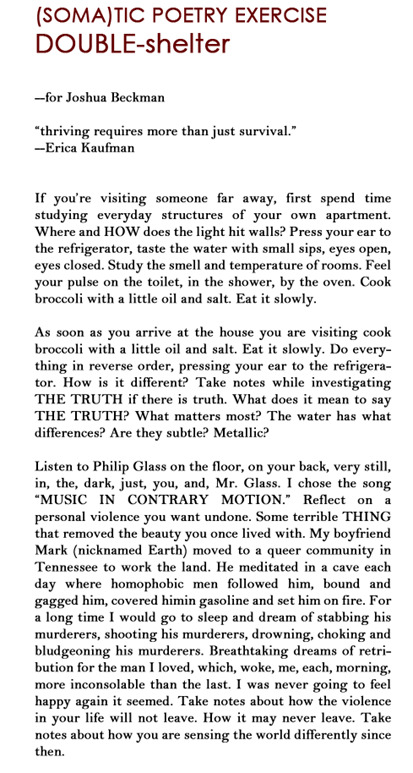
Something about CAConrad’s work really puts me off. I think part of it feels like there is an air of trying to make work similar to Fluxus and also trying to maintain the artistic elements of poetry. For example, listening to Phillip Glass on the floor, feels like a very artsy thing to do. Which sounds stupid, but idk it just seems like a bit much. However, in contrast to that feeling what I find interesting about CAConrad’s work is the communication of a personal narrative through the score. This score isn’t just for the reader to see the world in a new way, but to understand CAConrad in a new way. Thinking about the score in this way, listening to Phillip Glass may be artsy, but that is because CAConrad is artsy and they want you to understand how they felt at this point in time. In this way it is fairly reminiscent of Mattie Bryce’s EAT.
0 notes
Text
The Poe Dameron comics: Two ways to live together
I have read my share of comics in the new Star Wars canon and the Poe Dameron series is hands down the best of the lot. It’s some of the best comics I have read in years with great art, effective use of imaginative settings, fun action, and a story that keeps humor and hope despite grim events.
In this post I would like to me focus on the theme of the comics, especially as brought out by the conflict between Poe and his antagonist Agent Terex.
Theme is a word that sends many writers diving for cover, and with reason: it is boring and preachy when done wrong. The Poe Dameron series, however, stands out in handling theme exactly right, through a gripping conflict and the structure of the story.
This is because Poe and Terex embody two opposing ideas of how people should live together and form societies: Poe’s philosophy is based on respect and trust, Terex’s on fear and violence. Their choices and actions reflect these philosophies at every turn, letting the story explore what these abstract ideas mean and how they play out in the world of the fiction.
(Spoilers below the cut for Poe Dameron Volumes 1-2, or Issues #1-#13)
In this corner you have Poe Dameron, who is from the first issue onward absolutely committed to deescalating a tense situation and winning people’s trust. In his first mission in the comics visiting an insular and rather jumpy religious group, Poe not only refuses to draw his firearm after being shot at, he throws down a gun he took away from an attacker in self-defense. This is while people who are willing to kill him have multiple guns pointed at him.
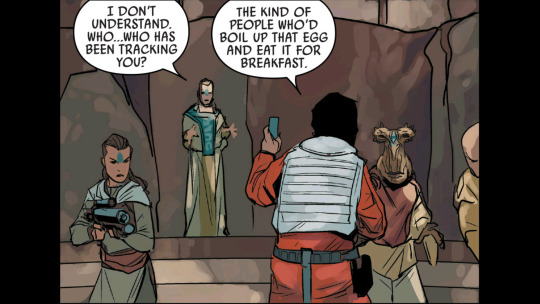
[Image description: The leader of the religious group asks Poe, “I don’t understand. Who... who has been tracking you?” Poe answers, “The kind of people who’d boil up that egg and eat it for breakfast.” Members of the group are aiming blasters at Poe.]
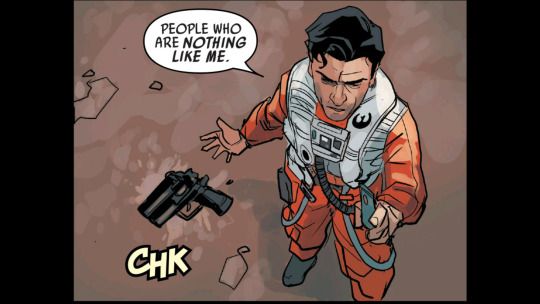
[Image description: Continued from the previous panel, Poe discards the firearm he was holding, saying, “People who are nothing like me.” (Emphasis in original)]
And then you get the bad guy on the scene, Agent Terex, an information officer of the First Order. He immediately threatens the religious group and the sacred artifact they were protecting. Terex even picks up Poe’s earlier joke about eating the egg for breakfast, which creates an amusing parallel given that he wasn’t even there for Poe’s joke. However opposed these two may be, at least we know they share a terrible sense of humor.
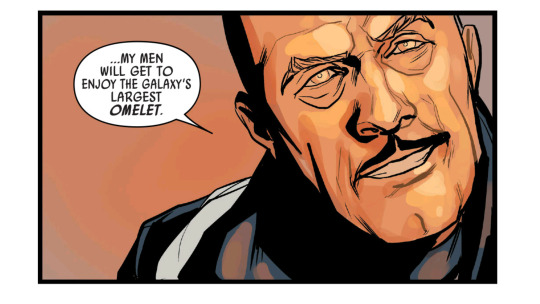
[Image description: Terex smiles as he says, “...My men will get to enjoy the Galaxy’s largest omelet.”]
The above by itself may seem like standard bad guy fare. What’s interesting, though, is that Terex assumes that Poe is as self-interested and ruthless as Terex himself is: That Poe is only protecting the religious group and getting on their good side to get the information he needs out of them.
This, of course, is clearly projection on Terex’s part, not Poe’s actual motivation, since Poe could have done what Terex was doing and threatened these people. Instead he went out of his way and risked his life to make himself unthreatening and gain their trust.
We see further contrasts not only in the way Poe and Terex each deal with outsiders, but with their own team. Poe relies absolutely on his team’s abilities, while double-crossing and murder are pretty much the standard in Terex’s dealings with his peers and subordinates.
Poe’s trust in Black Squadron’s judgment is clear from the very first arc with the egg-worshippers when, trapped in a desperate situation, he simply tells his squadron to get him some leverage. This is because he doesn’t know the tactical situation outside and has full faith that his teammates will accurately assess the situation and make the right call. As L’ulo remarks, Poe would rather trust his team than give a bad order.
This trust extends not only to the organic members of his squadron but also the droids. In the second mission of the comics, which involved retrieving information from a Hutt locked in a super-high-security prison, Poe's plan essentially leaves the mission’s success and his team’s lives in the hands of Black Squadron’s astromech droids. The comic shows us that this this leap of faith is not easy using the reaction of Jessika Pava, who is tense and unhappy at having to wait without doing anything.
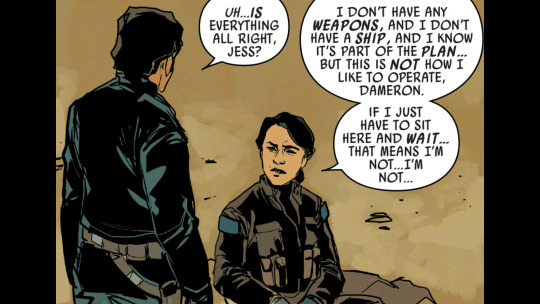
[Image description: Poe asks “Um... is everything all right, Jess?” and Jessika Pava replies, “I don’t have any weapons, and I don’t have a ship, and I know it’s part of the plan... but this is not how I like to operate, Dameron. If I just have to sit here and wait... that means I’m not... I’m not...”]
Despite the fact that a pilot under his command is voicing discontent with his plan, Poe reacts not by dismissing her concern but rather by validating and emphasizing with her.
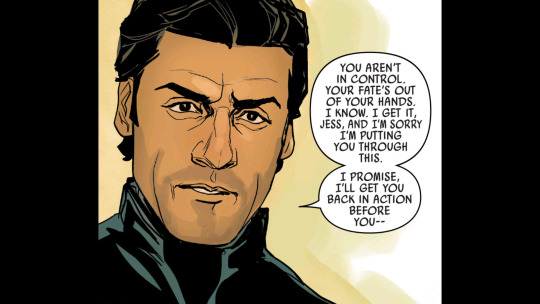
[Image description: A close-up of Poe as he says, finishing Jessika’s sentence, “You aren’t in control. Your fate’s out of your hands. I know. I get it, Jess, and I’m sorry I’m putting you through this. I promise, I’ll get you back in action before you-”]
This is what I mean by the importance of not preaching theme but bringing it out in the conflict. To drive the theme home the writing could have had Poe lecture Jess about the importance of trust and how their droids are entirely competent and deserving of their faith.
Such a speech would have been boring and patronizing to both Jessika and the reader, however. In this case it would also have undermined Poe’s entire characterization by making Poe a pompous blowhard instead of an empathetic guy who cares about people.
Instead, the story has Poe acknowledge Jessika’s feelings and the fact that he has asked her to do a difficult thing. This not only shows the reader the kind of person Poe is but also enhances the theme by emphasizing that full trust is an active and sometimes a difficult choice, for Poe as well as for Jess.
Terex, in contrast, not only spends the same story arc double- and triple-crossing everyone he makes a deal with, at the climax he attempts to slaughter the entire prison. In the later story arcs Terex is further shown, both in flashback scenes and in the present, ruthlessly backstabbing and killing every single person he works with who crosses him.
The part where Terex attempts to kill the entire prison population is another interesting moment because he’s counting on Poe coming back to stop him, showing his awareness of what makes Poe Dameron tick and the contrasts between them. Where Terex sees people as fair game to hurt and kill for his own ends as long as he can get away with it, while Poe sees them as vaulable in themselves no matter who they are.
Poe came back to save the prisoners just as Terex foresaw, of course, prisoners who included some of the most dangerous criminals in the galaxy. Poe’s commitment to the value of each individual is so absolute that in a later issue he even goes back to save a droid, C-3PO, to the astonishment of his enemies.
The difference in how Poe and Terex relate to people shows in even small things, like how they deal with titles. Here’s Poe, not wanting C-3PO to call him “Master:”
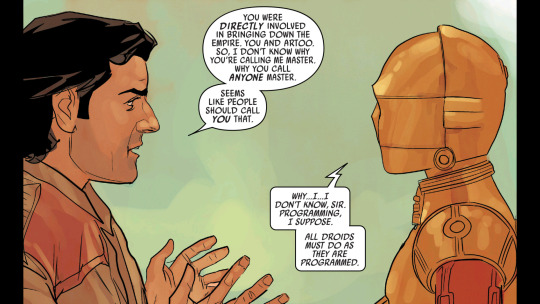
[Image description: Poe tells C-3PO, “You were directly involved in bringing down the Epmire. You and Artoo. So I don’t know why you’re calling me master. Why you call anyone master. Seems like people should call you that.”
3PO replies, “Why... I... I don’t know, sir. Programming, I suppose. All droids must do as they are programmed.”]
Terex on the other hand says from his first meeting with Poe that titles are important and insists that he be called “Agent Terex.” It’s easy to tell this isn’t a matter of principle but of domination, though, as he pointedly calls Poe by name without a title. And then there’s this part:

[Image Description: Terex announces from the Carrion Spike, “This is Lord Terex. I have returned.” BB-8 responds with WTF? “Breet?” and Poe says, “I know, right? Lord Terex? Guy’s pretty improssed with himself.”]
The contrasts and parallels between Poe and Terex also appear in the way they go into personal crises at the same point in the story. For Poe it is the realization that there is a mole in Black Squadron working for Terex. For Terex it is self-doubt from his continuing losses to Poe.
It’s telling that Poe’s greatest inner turmoil is not about facing down a dangerous opponent like Terex but having to question Black Squadron. The trust in his team which is so essential to who he is as a person is threatened, and that bothers him more than constant threats to his life.
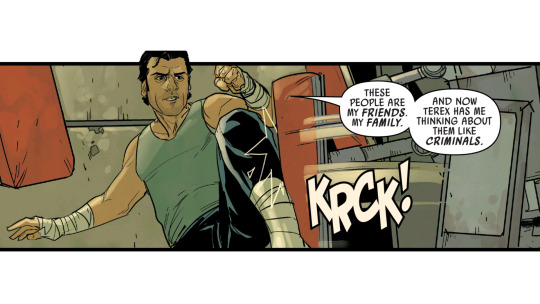
[Image description: Poe kicks a training pad, saying, “These people are my friends. My family. And now Terex has me thinking about them like criminals.”]
It is fitting, as Poe’s antagonist and foil, that Terex is also in a personal crisis at this time. This is also the part where we delve into Terex’s back story: A former Stormtrooper in the Empire, he was there to see the Empire’s final hopes die in the Battle of Jakku. He escaped the battle, and Jakku, alive with his colleague Corlac. Seeing promise in Terex and devotion to the cause of the lost Empire, Corlac talked Terex into working together to repair a fleet of ships that, Corlac promised, would restore the Empire.
While working on the repairs Terex learned that Corlac and the people Corlac brought in had no interest in the Empire and were just using his access codes and talents to profit off the ships, and (surprise!) killed them all. He then became a major crime lord, becoming known as the aforementioned “Lord Terex” on the crime-ridden Outer Rim planet Kaddak. He describes his epiphany this way:

[Image description: Left-hand panel with Terex saying, “The Empire fell. With it fell order. With it fell law. They’re never coming back. It’s taken me a while to realize that--I think I was grieving.”
Right-hand panel with Terex saying: “I’ve accepted it now. I know what it means.”]
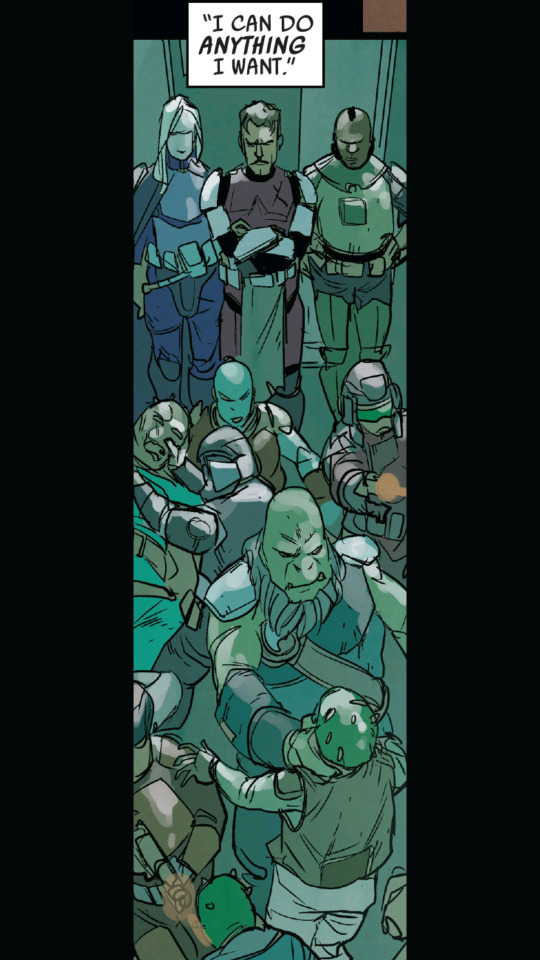
[Image description: Terex’s line, “I can do anything I want,” is imposed over a later scene of him watching while his minions do his bidding to cause violence and mayhem.]
Decades into his successful criminal career Terex found out about the First Order through recovered Stormtrooper armor and, still unable to relinquish his dreams of the Empire, offered his services. With his recent losses to Poe Dameron, however, he perceived a growing gap between his methods and the First Order’s and sought to return to his criminal roots, throwing off the First Order’s restrictions.
Terex may have believed he turned to a life of crime because the Empire fell, and that his identity as a criminal was at odds with being a First Order agent. I don’t buy that, though. There was a reason he clung to the Empire’s ideals in the first place, and that was because they fit his personal ideals. Serving the Empire may have shaped his personality and outlooks, but whether the chicken or the egg was first, Terex’s worldview was that of the Empire: To quote Thucydides, the strong do what they can and the weak suffer what they must.
So how did their different approaches work out for Poe and Terex? They both have their share of hurdles, but as of the end of Volume 2 Poe is definitely coming out ahead despite serious setbacks and losses. As discussed above, he overcame Terex by gaining and giving trust with strangers and teammates alike. Where even his considerable individual strengths might not have been enough, his team and allies made up the difference and swung the odds in his favor.
I believe this approach worked even on Oddy Muva, who was coerced into betraying Black Squadron and the Resistance. I think Oddy responded to the respect and friendship Poe treated him with, and this was one of the reasons he took such tremendous risks to rescue his wife and free himself of Terex’s coercion.
Terex, on the other hand, not only lost every engagement with Poe in large part due to his backstabbing ways, he even lost the support of the First Order by treating its officers with complete contempt and disregarding their orders. He made a common mistake of those who believe might makes right: He forgot that he’s not the toughest guy in the room.
To conclude, Poe and Terex are not just two very different men and enemies with opposing philosophies. They are also embodiments of the kinds of societies they aspire to, one based on mutual trust and consent between beings who have inherent value, and the other based on the absolute rule of the strong over the weak. The story of their enmity is a story of opposing political philosophies as well as one of military action and intrigue.
Poe will continue to grapple with the question of how people live and work together in a free society, especially in the face of an existential threat to freedom itself. He will have to balance his instinct to trust his people with the grim reality of war. Whatever Terex’s role in the ongoing series, his conflicts and contrasts with Poe helped bring out the recurring motifs in Poe’s story and that makes Terex a great antagonist. Their fight, like the larger struggle between the Resistance and the First Order, is a fight for the soul of a galaxy far, far away.
14 notes
·
View notes
Text
Kanye West: Othello Reincarnate (2018)
For this portion of the project I will bring excerpts from Shakespeare’s Othello (1603), Baldwin’s The Fire Next Time (1963), and West’s Yeezus (2013) into dialogue with one another in order to both highlight the effects of Eurocentrism on the black man’s self-perception and support my claim that Kanye West may be seen as a modern manifestation of Othello. I hope to also bring the integrity of Othello’s character into question by comparing the ways in which he and West, both black men in strikingly similar positions, respond to the racialism perpetrated by their societies. I don’t have much to say about the visual element (a split portrait of Kanye West and Laurence Fishbourne’s Othello) of this assignment; it speaks for itself within the context of this comparative analysis. West’s most recent controversial Tweets will not be factored into this essay.
¨
I would like to present the following quote as a preface to this un-essay:
Well, the black man has functioned in the white man’s world as a fixed star, as an immovable pillar: and as he moves out of his place, heaven and earth are shaken to their foundations. Baldwin 9
In his book The Fire Next Time, an empirical account of racism in America, Baldwin addresses the foundation of racism against people of color when he writes, “white Americans have supposed ‘Europe’ and ‘civilization’ to be synonymous-…” (93), an idea often identified as “Eurocentrism”, a term that Lois Tyson academically defines as, “the belief that European culture is vastly superior to all others” (361). Eurocentrism pervades the pages of Othellothrough the racist stereotypes that Shakespeare employs to contrive Othello’s character as well as through the racist assumptions and associations made by the vast majority of the play’s supporting characters. These stereotypes include, but are not limited to: demonizing individuals of color, ascribing a mystical capacity to express savage rage to individuals of color, and labeling individuals of color as sexually promiscuous. I believe Shakespeare’s superficial representation of Othello also accounts for the way in which Othello responds to racism; he becomes a receptacle of internalized racism, a mere victim of his own blackness. Baldwin addresses the issue of internalized racism when he writes, “Long before the Negro child perceives this difference, and even longer before he understands it, he has begun to react to it, he has begun to be controlled by it” (26). A society that thoroughly asserts the notion that people of color are inherently inferior to whites almost inevitably conditions the discriminated group to believe in that false notion. The dominant racial and social hierarchy become unavoidable. Othello, unfortunately, fails to perceive Eurocentrism as false and becomes controlled by his otherness. He easily accepts Iago’s conjectures about his wife’s infidelity because he already believes that he, a man of color, pales in comparison to a white man.
If it weren’t for Shakespeare’s utilization of the stereotype that black men are extremely naïve, would Othello have met his tragic fate? Kanye West presents a possible answer to that question.
In June 2013, Kanye West released his greatly anticipated 6thstudio album under the Christly and controversial title Yeezus. The album proved to not only be an aural triumph, but an exclusive look inside his relationship with TV personality and businesswoman, Kim Kardashian. The album cohesively progresses through a narrative of the couple’s fated romantic union and offers insight into West’s role as an infiltrator of “high society”. Yeezus most notably voices the new perspective of racism West gains after his relationship with Kim goes public in the lyrics of his passionately anti-racist, overtly titled tracks “Black Skinhead”, “New Slaves”, and “Blood on the Leaves”. Despite my admiration for the album as a whole, I will pay specific attention to the lyrics of “Black Skinhead”, a song that offers the most concrete similarities between West and Othello’s experience with racism.
The most obvious similarity between Othello and Kanye West lies in the fact that they both dared to overstep their bounds in a white man’s world by marrying a wealthy white woman from a prestigious family. Further similarities lie in the fact that both men achieve upward mobility, both men’s relationship to white women seems to accentuate their blackness, and both men develop similar self-perceptions after coming out to the public with their relationship. (On a less relevant note, both men are deeply attached and incredibly sentimental about their dead mothers.) I found that despite the 400-year gap between the two unions, both men’s marriages left them susceptible to not only morestereotypical labels, but the samestereotypical labels.
A direct reflection of the issues Othello faces exist within the lyrics of “Black Skinhead”, proving the alarming fact that the stereotypes about people of color that existed several centuries years ago still exist today. I interpret “Black Skinhead” as West’s rejection of the particular type of racism he faces as a black man in a relationship with a white woman as well as his proud acceptance of the role as the villain, the demonized black man.
In the first verse of the song, West addresses a common reaction evoked by his relationship with Kim when he raps, “Enter the kingdom/ But watch who you bring home/ They see a black man with a white woman/ At the top floor they gone come to kill/ King Kong/”. Here, “kingdom” refers to “high society”, the exclusive, wealthy, and dominantly white faction of our culture to which he gains access through his relationship, while of course the “top floor” refers to a penthouse suite, a room only attainable those who can afford it, and alludes to the iconic scene in King Kongthat depicts the monster holding a white damsel hostage on the top floor of the Empire State Building. I find that these lines parallel with the first scene of Othello when Iago and Roderigo urgently translate the news of Othello and Desdemona’s marriage to Brabonzio. In both cases, the relationship between a black man and a white woman immediately rouses suspicion of ill intent as well as dehumanizing associations of black men with animals, except rather than call Othello a gorilla Iago calls him a “an old black ram” (1.1.86). A few lines down in the first verse, West expresses his disdain for questions about his character when he shouts, “Came to see me in my black skin/ Number question they askin’/ Fuck every question you askin’”. These lines present an interesting comparison to Othello. They got me thinking: what if Kanye was in Othello’s position in Act I Scene III? Surely, he wouldn’t respond to their incredibly offensive inquisition in the respectful and self-degrading way that Othello did. Kanye would never utter the words, “Rude am I in my speech,” (1.3.81), to a jury of white men questioning his right to be with Kim, nor would he ever state, “I do confess the vices of my blood” (1.3.124) to appease the ego’s of the same group of white men.
The progression of the lyrics within the chorus of “Black Skinhead” demonstrates the way in which racism ingrains itself in the self-perception of the subject of discrimination; the constant projection of negative stereotypes onto their character transform them into an object of those prejudices. The first and second chorus contain the line, “They say I’m possessed, it’s an omen”, yet these lyrics undergo a subtle change in chorus three with, “I think I’m possessed, it’s an omen”. I interpret this transformation as West’s declaration of his submission to the influence of the racist stereotypes that surround him, similar to the submission to the false destiny of a self-fulfilling prophecy. The word “possessed” denotes the stereotype that black men are susceptible to demonic expression of emotion, a stereotype also inscribed to Othello. The most explicit reference to this occurs in Desdemona’s fearful reaction to one of his bouts of extreme emotion, “And yet I fear you, for you’re fatal then/ When your eyes roll so” (5.2.37-38). Both West and Othello’s passionate emotions are interpreted as fiendish because of their skin color. The difference between West’s and Othello’s connection to this particular stereotype lies in the fact that Othello never disclaims this quality as a trait imposed by others, but rather believes he possesses a sort of infernal power, “Arise, black vengeance, from the hollow hell;/ Yield up, O love, thy crown and hearted throne/ To tyrannous hate” (3.3.442-444).
Othello’s character makes a radical transformation within the play. He starts off as a well-mannered, obedient, and charming man, but gradually evolves into a man consumed by jealousy and rage. It’s not the evolution of his character that strikes me, but the uncertainty that he expresses throughout this transformation. Othello even wavers between passion and rationality in the midst of murder. He seems to be driven by a force that he’s not wholly committed to, he plays the part he believes he’s supposed to play: the savage black man. West on the other hand, very consciously plays the role of the villain in spite of his white critics. The electrifying chorus to “Black Skinhead” explicitly acknowledges society’s demonization of his race and proudly proclaims his intent to bring chaos to the order he’s shaken by publically loving a highly idealized white woman, “Baby we livin’ in the moment/ I’ve been the menace for the longest/ But I ain’t finished, I’m devoted/ And you know, and you know it”. West is aware of the fact that his flagrant behavior causes the public and media to brand him with race-specific labels. Since he’s not willing to compromise the integrity of his persona by conforming to more Eurocentric types of behavior or expression, he simply carries on with his usual behavior and embraces his label as “menace”.
Baldwin addresses the superficial way in which white men perceive black men when he says, “…they could deal with the Negro as a symbol or a victim but had no sense of him as a man” (58). I find Shakespeare incredibly guilty of this. He makes Othello both a symbol of stereotypical blackness as well as a victim of his blackness. He does so by centering Othello’s character on his naivety, his rage, and his shame. I firmly believe that Othellowould be a much better play if Othello, a man of experience, resilience, and fortitude as suggested by his past and his present military career, were to take pride in his race rather than wear it shamefully. Shakespeare would be far too ahead of his time if he were to represent a black man as a figure of virtue and intelligence. Regardless of what could have been, no black man should ever feel like a villain for falling in love.
0 notes
Text
The Exile of Kanye West from Ta-Nehisi Coates’ Brittle Black Pantheon
On Culture, Black and Human
The big, bad lapdog of neoliberal white America is back to his one-note bark once again. Like a porn addict with a renewed hunger for more of the same, Ta-Nehisi Coates, polysyllabic but monomaniacal as always, is again on the prowl for white supremacy, summoning up more gooey gobs of words to indulge his fiendish fetish, of which neither he — nor apparently his editors at the Atlantic — can ever seem to get enough. The particular target of his latest 5,000-word fantasia is Kanye West.
(function(w,d,s,i){w.ldAdInit=w.ldAdInit||[];w.ldAdInit.push({slot:10817585113717094,size:[0, 0],id:"ld-7788-6480"});if(!d.getElementById(i)){var j=d.createElement(s),p=d.getElementsByTagName(s)[0];j.async=true;j.src="//cdn2.lockerdomecdn.com/_js/ajs.js";j.id=i;p.parentNode.insertBefore(j,p);}})(window,document,"script","ld-ajs");
Who is Kanye West? He’s some hip-hop artist … or so I’ve heard. Sure, I’m being facetious, but really, when you stop to think about it, who is Kanye West? He’s an entertainer, a prominent and prolific black entertainer who recently made some controversial comments in favor of Trump and against the notion that black Americans need to be forever victimized by and enslaved to slavery, as it were. To Ta-Nehisi Coates, who makes a ritual habit of raising the slave ships’ mainsails every time he embarks on his rhetorical voyages and whose entire M.O. is to keep Americans of every race perpetually enslaved to the original sin of slavery, West’s words were, of course, flagrant heresy. And so Coates takes the occasion to muse on black celebrities — the heroes and the traitors to “the cause” alike — and how those like Michael Jackson and Kanye West who aspire to deracinated celebrity rather than the specifically black celebrity that is supposedly their birthright are fleeing an angry ghost and overdetermining history they can never hope to escape.
This is a sad little world in which Coates lives and in which he would confine people based on the color of their skin. And it is a brittle world as well. I return to my question: who is Kanye West? … and, more importantly, why does Ta-Nehisi Coates — a self-styled intellectual, a thinking man — care if a notoriously outspoken black entertainer makes some inartfully worded, off-the-cuff remarks that don’t jive with the dominant narrative — victimhood, slavery, racism, etc. — of what blackness in America is supposed to be all about? Why does his whole world rise and fall on the shoulders of the athletes and entertainers that he forthrightly calls “Gods,” people like Kanye West or Michael Jackson, people like Stevie Wonder, James Brown, Ray Lewis, Colin Kaepernick or O.J. Simpson? Coates has claimed to be an atheist, a rarity among African Americans, but in this particular respect, his worldview unfortunately echoes another dominant strain of African-American theology, a slavish worship of the dollops of pop icons the American capitalist culture industry serves up in supersized portions. Slurping up with relish, to the last drop, its Big Gulp of saccharine flavors, he later finds himself brought short when the ill effects of too much artificial sweetness start to rot the body — his precious, mythologized “black body” — from within. When O.J. is on trial, it is as if all black America is on trial. When Michael Jackson dyes himself white, it is as if a part of black America dies. When Kanye lavishes praise on Trump, it is as if a dagger is thrust into the single black heart to which the black American ritual drum must beat. Good business is good for business, but art and culture are, or should be, a different kind of business altogether. When you kneel before the ever-changing display of glittering artistic, cultural and athletic idols adorning the capitalist temple of Mammon and never bother to wonder whether a deeper truth is out there to be found, you get what you’ve got coming to you.
The underlying pathology at the heart of black America’s fragile constitution, the underlying reason that Ta-Nehisi Coates cares so deeply about what an entertainer like Kanye West says and does, is that black American culture has little sense of history. There are the larger-than-life flavors of the moment — Kanye, Beyoncé, Oprah, Michelle Obama and the like — there are the saints and sinners of the “Old School” — the icons you loved when you were young or the ones your parents and grandparents told you of: Michael Jackson, Michael Jordan, Run-DMC, James Brown, Martin Luther King Jr., Malcolm X, James Baldwin, etc. — and then, once that short trail peters out, black America is lost in the woods. Go further out, and all there is is slavery, the mythical “drum” and the “slave ships” — both of which make their obligatory appearance (and, what is more, in the same sentence) in Coates’ latest piece — and, still further out, a still more heavily mythologized ancient African homeland of peace and harmony, natural wonders, dances and divine rhythms and, to the north, a land of vast sands, heavenly pyramids and divine pharaohs incongruously recruited to join up in the “black” cause. No wonder, then, that mainstream black culture’s approach to black celebrities of the present and of the very recent past is so thoroughly theological, making such figures indispensable to the consolidation of the contemporary black sense of self.
White America, of course, is not quite so overinvested in its present-day racial archetypes and allows its heroes to be of many races, to speak with many voices. Although Coates, just last year, lambasted white Americans for allegedly manifesting their white identitarian politics in electing Trump (a misguided argument I’ve debunked in some detail here), the irony is that while only 58% of those whites who voted in the presidential election voted for Trump, a whopping 96% of black voters in 2008 and 94% in 2012 voted for Obama. Meanwhile, many of those same whites who voted for Trump in 2016 had voted for Obama in 2008, so many, in fact, that, he had “won the largest share of white support of any Democrat in a two-man race since 1976.” So on which side of the fictional line separating “black” from “white” do the real racists reside?
Nor is this merely about presidential politics. The fact is that there simply is no unitary white pantheon of contemporary or recently enshrined “Gods” akin to those worshipped by Coates. Whites have their cultural heroes, sure, folks like Elvis, the Beatles, Madonna, Tony Robbins or Tom Brady, but also, folks like Michael Jackson, Michael Jordan, Oprah, Martin Luther King Jr., and even, for many, Barack Obama, even, for some, Ta-Nehisi Coates himself. And if these heroes should take a hard fall, there is a backup stable — in fact, the true starting lineup — of many others spanning the centuries from the dawn of recorded history to the present, people like Homer and Shakespeare, Mozart and Beethoven, Leonardo and Michelangelo, Galileo and Newton, Lincoln and Washington…. The Biblical prophets, the builders of Ancient Egypt, the thinkers and writers of Ancient Greece and the forgers of Imperial Rome and Ming Dynasty China … all these, too, are part of that same generous pantheon. This is not white culture or European culture or even the culture of the West. It is simply culture, human culture. It is owned by no one.
It is only when that culture is attacked and undermined, when its claim to represent the universal heights of truth and beauty — “the best that has been thought and said in the world,” in Matthew Arnold’s oft-quoted phrase — is relativized and ridiculed, that we get to a place where blacks begin to essentialize their racial identity and contrive a need for their own darker-skinned set of parallel deities. Only after the deep, fecund ground of universal culture is pulled out from under our feet and a giant misstep plunges us — and plunges blacks more than anyone else — into the shallow cesspool of identitarianism do we get to the point where Ta-Nehisi Coates, seeing Kanye West flailing to break free of his racial manacles, can summon West back to what Coates imagines as a permanent black “home” in this impoverished, cramped, ramshackle dwelling place:
And so for Kanye West, I wonder what he might be, if he could find himself back into connection, back to that place where he sought not a disconnected freedom of “I,” but a black freedom that called him back—back to the bone and drum, back to Chicago, back to Home.
But Coates’ vision of freedom is, of course, a thoroughgoing species of parochialism, and worse, a vision of never-ending enslavement to the tragic side of the black American experience.
(function(w,d,s,i){w.ldAdInit=w.ldAdInit||[];w.ldAdInit.push({slot:10817587730962790,size:[0, 0],id:"ld-5979-7226"});if(!d.getElementById(i)){var j=d.createElement(s),p=d.getElementsByTagName(s)[0];j.async=true;j.src="//cdn2.lockerdomecdn.com/_js/ajs.js";j.id=i;p.parentNode.insertBefore(j,p);}})(window,document,"script","ld-ajs");
History and culture offer us all, black Americans included, far more than the tired, repetitive cadence of the bare “bone and drum.” But for Coates to let go his disappointment with Kanye, he and all black Americans must first let go of its flipside, the rickety racial pedestal on which Kanye and all of Coates’ other all-too-human “Gods” stand awkwardly elevated. He must let go “black freedom.” He must let go black culture. And he must embrace our culture, the one universal human culture that recognizes the law of greatness alone and that belongs, in equal measure, to me and to him and to anyone else willing to leave their local lore and superficial commitments behind at the base of the mountain and devote their lives to the difficult upward journey.
Thank you for reading Republic Standard. We publish this magazine and the Freebird Forum because we believe in free speech- but it doesn't come cheap! Will you make a small donation towards our running costs? You can make a difference by clicking here.
If you love free speech, we are building the platform for you! Read about how we are building FreebirdTV, open source video hosting with no thought-policing.
The Republic Standard Web Shop is now open! Every piece of merchandise you buy is a victory against the nerds.
from Republic Standard | Conservative Thought & Culture Magazine https://ift.tt/2IwHYDV
via IFTTT
0 notes
Text
Spider-Man 3: Revenge is a Dish Best Served Without Alien Suits...
So here we are at the end of the Raimi Spider-Man trilogy and we now have probably the most disliked of all the Spider-Man movies (though some would swear that the Amazing Spider-Man movies were worse but I’ll get to those on a later date) and I can definitely see why the movie has received this reputation. From corporate meddling to the poorly executed arcs of the characters to there being just too many characters to begin with, the movie has in a lot of ways earned its title as one of the worst live action Spider-Man movies. But I’d rather not dwell on these negatives for long, there are plenty of reviews I could name that have done a better job at criticizing this movie on a technical level than I could. While there are many poor design choices that I will have to bring up inevitably I want to instead continue my focus on what these films are trying to convey by their overall message and how that message is executed within the film through its characters. So let us get into the details and see how well or how poorly these elements were implemented within the film.
First off we need to figure out what the message is, and I think it is safe to say that the moral conveyed throughout the whole movie is the idea of forgiveness and the dangers of revenge. Throughout the course of the movie there are an extremely large amount of characters and the one thing shared through every single character in the movie is the fact that someone or something has spited them and they feel the need to get payback for the justice or injustice done to them. From Harry, Eddie Brock, and even the Venom suit wanting payback against Peter to Peter wanting payback against Sandman it seems as though every character has some sort of vice that drives their character and it’s their choices of how to handle their hate that lead them down to their inevitable fates, whether they be good or bad. While I feel a lot of the impact of these moments were dampened by the sheer amount of characters that the movie was trying to balance it is undeniable that the theme consists throughout the movie and is relevant throughout, and shows the damage that these actions make on these characters.
Once again we start with Peter, but unlike the previous two movies Peter starts the movie in a place of happiness and satisfaction. Spider-Man is well liked throughout the city, Peter is doing great in school, and his relationship with Mary Jane is going well. While the events with Harry will eventually come to play a role in the message I want to go into the events with Flint Marco, otherwise known as the Sandman, as I believe his actions in relationship with Sandman will play a much greater role in Peter’s story than the other villains or conflicts will. When the story reveals that it was actually Flint Marco that kill Ben and not the mugger that we thought it was in the original movie Peter goes into a state of pure frustration, and is the key event that send Peter down his slippery slope that would lead to him becoming the jerk he would become later into the movie. I always found this interesting as when I first found out about this I was curious what actions Peter would take and how the story would handle this, as Peter’s actions got the mugger in the original movie unintentionally killed so he may feel much more guilt knowing that the mugger did not kill Ben, and also took away Peter’s involvement in the events that fateful night, as in Peter’s head he would have died whether he had let the mugger go or not. While not directly stated within the movie itself these sort of feelings must have played into Peters feelings of anger and frustration, but the film only really focuses on Peter’s want for revenge against the murderer who got Uncle Ben killed, further enhanced by the suit Peter wore. So when Peter chose to go out of his way to attack the Sandman it becomes quite disturbing when he attacks without getting any of the details of what happened that night and says good riddance at his apparent death, as it shows how far Peter will actually go to get revenge against people who do something to hurt him. We later see this with Harry as well as when Harry sabotages Peter’s relationship with Mary Jane, with Peter dominating his fight with him and when Harry tries to throw a bomb at him he returns it with not a care in the world. It’s only after Spider-Man realizes how far he has fallen after hurting Mary Jane does he stop and realize how far he has fallen, and by this point he has alienated a lot of his former friends. This does, however, lead Peter to learn to control his anger, and he is able to remain calm enough to talk with the Sandman and learn what truly happened the night Ben was killed and the difficult position Marco was in in order for Peter to finally put his vengeance away. While this scene is touching it’s also difficult to feel earned as well, as a lot of the actions Peter takes throughout the movie are due to his dependence to the suit that is affecting him mentally, and as a result a lot of the actions he takes don’t feel as though he is fully responsible for his own actions. As a result his arc throughout feels somewhat empty, as some outside force has basically come along and ruined Peter’s life and it’s questionable how much of a lesson Peter needed to learn as the villains and antagonistic forces continued to sabotage Peter’s life.
Next let’s talk about Harry, as Harry is actually the person who represents revenge and need for learning forgiveness much better than Peter actually does. Ever since the end of the first Spider-Man movie Harry has been devoted to his plot of revenge against Spider-Man, and this continues throughout the entirety of Spider-Man 2 as well as he continues to grow more and more angry at the web slinger and grows more devoted by the scene he is in. At the end of the previous movie he has learned that Peter is Spider-Man, and for the first time he resists and questions what he is doing, even denying the mental image of his father telling Harry to avenge him. When the third movie begins however we see that Harry has given in to the temptation and begins his plot to overpower and kill Spider-Man, resulting in his amnesia. While the scenes with Harry after losing his memories of his father’s death are overall positive like with Peter it is hard to give Harry any credit for it, as the second he reclaims his memories he goes right back to his vengeful ways despite enjoying the happiness of being with his two friends again. The scene where Harry and Peter should have come together and make amends with Harry forgiving Peter doesn’t actually end up coming, as the Butler reveals what the audience has known since the first movie, the fact that Norman killed himself with his own glider and Spider-Man had nothing to do with his death. As a result Harry’s moment of realization has nothing to do with forgiving a past mistake but came about from learning the truth that he could have learned at any point, and as a result his arc becomes the reverse of what Peter’s issues when it comes to the story. While Peter had an actual issue he needed to overcome and he does come to the right decision of forgiveness in the end he had to suffer from being not in control of his own actions throughout a large part of the movie Harry had great buildup of revenge caused by his own actions and desire for revenge but because they were built on a misunderstanding he is unable to really forgive Peter because Peter has nothing to be really sorry for, outside of the actions that he did while being influenced by the suit.
Finally I would like to talk briefly about Eddie Brock, as he functions as the major antagonist of the film and plays a bit into the parallels of revenge. Like the Green Goblin and Doctor Octopus before him Eddie shows the dangers of how Peter’s actions could play if he makes the wrong decision when it comes to his decisions, this time showing how dangerous being dependent on the suit can be and how becoming to devoted to revenge can cause a lot of anger. Eddie starts out as a jerk but also as a reasonable guy who has a lot going for him as a photographer. However as he continues to try and further his career he buts heads with Peter and resorts to manipulating photos that Peter made to make Spider-Man look bad and appeal to Jameson, resulting in him being found out by a corrupted Peter and losing his job. After also loosing Gwen he resorts to downright praying for Peter to die, upon which he discovers the black suit and subsequently becoming Venom. Like Peter Eddie is heavily influenced by the suit to commit the actions he takes, and also uses the knowledge from the suit to get his revenge in their final showdown, but unlike Peter who was able to recognize his own actions and take steps to remove the suit Eddie becomes devoted to it and embraces his hatred for Peter, despite the fact that it’s the suit that Eddie is wearing that resulted in Peter’s bad behavior and his own actions that resulted in his misery, not Peter himself. This makes his death in an attempt to save the suit all the more telling of his character, and show how weak of a man Eddie actually was.
Despite having a message that I feel could have been amazing and worked well with Peter’s character and this film and characters in general this movie suffers from the fact that it simply tries to balance way too many characters and events to make any of them be executed properly. Due to the outside forces playing into the characters actions a lot of the message ends up being executed poorly or downright ruined despite the amazing potential that was presented and the buildup made. It goes to show that having a message being present throughout the movie doesn’t automatically improve the films quality, as it takes a lot of time and care to make that message resonate and mean something to the audience in the end.
References: Spider-Man 3. Dir. Sam Raimi. Columbia Pictures, 2007. Film.
0 notes